#nor does it mean that youre morally superior
Explore tagged Tumblr posts
Text






Bodily autonomy includes the right to do drugs. Yes, even the drugs YOU think are bad and scary and dangerous.
People absolutely deserve access to free, compassionate recovery resources, but ONLY if they want them and find them useful.
You have to understand just how many "rehab" programs are effectively prisons, cults, or both. You have to understand and be compassionate toward the reasons behind self-medication. And above all else, you have to LISTEN to drug users about what is actually effective, useful, and wanted aid.
Otherwise you're just part of the problem.
#look around and see#leftism and learning#safety resources#support resources !#addiction#i have so many thoughts on the way drug addicts are treated#but these make very good points#and ive always said that if people really want to do those things#(sex and drugs usually as the topic)#they will do them anyway#and id rather they be safe than try to forcefully stop them#because i could do more harm than help#and also yeah: people doing things with their body that YOU dont approve of does not mean their autonomy should be removed#nor does it mean that youre morally superior#and the emphasis on “health” as an argument for why addicts should be forced to stop using#or deal with being mistreated is just ableism anyway#their health is not a moral statement and it is not an indicator of humanity#and if you approach it as such i do not trust you#bodily autonomy#personal
18K notes
·
View notes
Note
What about a sub!villain who tries to play the part of the suave, dominant villain cause they’re afraid of vulnerability… and an actually dominant hero who sees through it and flips the script. Could it also be spicy please?
Also, your writing is amazing and it makes my day better! Thank you so much for sharing it! I send you hugs!
"You may think you're deceptive. But you are not." The end of the villain's dagger nearly buried its way into their own skin. Although the villain couldn't recall when the hero had gotten a hold of it during the fight, they were quite pleased with the result. (The result being the hero on top of them, still panting from the fight.) "Your effort is quite delightful, though."
The villain cracked a smile.
"Oh, you want to ravage me so bad..."
"Your imagination doesn't even come close to how bad I truly want that," the hero answered.
There was something in their presence that stirred the villain in an exciting way. Was it their body? Their personality? Their morals and their desires? Usually, the villain considered themselves to be talented when it came to reading people and analyzing the relationships they had with them.
For better or worse, it was different with the hero. More confusing. More dangerous.
At this point, the villain was playing with fire - they didn't know exactly what their relationship with the hero was nor where they stood.
"I loathe you for being my only weakness." The hero let the blade dig into the villain's chin until they looked up. "And destroying you would probably bring me some peace."
"Oh." The villain had never heard such a blunt statement coming from the hero. At least not something this personal and...open. It nearly made the villain sick to their stomach how casually the hero had mentioned it.
Slowly, the hand which wasn't holding onto the dagger travelled up the villain's arm until those cursed fingertips found a shaking wrist and grabbed it.
"But what am I without you? What is Orpheus without his muse?"
"You're so charming today..." The villain tried to sound as flirty as they could but their voice was inexplicably trembling.
When had the hero decided to be so horrible and seduce the villain? And why on earth was it working?
"How does that make you feel?" the hero asked, their voice nothing more than a whisper. They freed their index finger from their grip around the villain's wrist and slowly, agonizingly, let it travel upwards. The villain took in a sharp breath, surprised by the hero's actions.
It felt a little too intimate. Nearly immoral.
The villain felt quite stupid for blushing, after all, it was just the hero's finger rubbing against their palm and their breath on the villain's neck.
"I'm..." The villain tried to concentrate but it wasn't that easy anymore. They closed their eyes, close to defeat already. "Sorry, what do you mean?"
Did the hero have to level their weight on the villain's hips? Did they have to say these things? Startle the villain like that? Couldn't they just flirt, try to kill each other and go home after?
Did the hero have to whisper something this close to a confession into the villain's ear?
"How does it feel to be my only weakness?" the hero murmured. Their grip loosened and slowly, their hand began their conquest towards the villain's fingers. "How does it feel to mean so much to me? To occupy my thoughts during the day? And my dreams during the night?"
Hell, the hero was dreaming about them?
"What are you doing...?" Suddenly, the hero let their fingers entwine, squeezing gently and for whatever reason, the villain took in a quick breath.
"I believe we both know you crave a superficial relationship. Something that makes you feel superior and secure. But I can tell you from personal experience that those relationships don't work out in the long run. They will make you feel miserable. They will make you feel worthless. If I want you, I will want you bare. And there is nothing I desire more." Their lips were close to the villain's. "In your own time, of course. You strip. Figuratively and literally, obviously."
"I- You-"
"I am always willing to help, though." The hero smirked lazily and squeezed the villain's hand. "There is no reason to feel ashamed. Or to feel weak. After all, you have me in your hand."
The villain couldn't say anything.
It had started as a normal fight. With the usual flirting.
And now, the villain was actually thinking about opening up to someone. To talk about all their horrible fears and the self-doubt. About all their mistakes and regrets.
This had to be some new weapon or master plan to turn the villain into a good person. Whatever it was, the villain feared they would think about this encounter for the months to come.
"I will keep this, though," the hero announced. They held up the villain's dagger and pushed themselves off the villain. "Everyone needs a memento of their beloved, don't they?"
All the villain could do was stare as the hero blew them a kiss and vanished into the night.
#I wrote my way out of hell#didnt read over it#also its short cuz yuh body said no today#writing snippet#heroxvillain snippet#heroxvillain prompt#heroes and villains#hero#villain#heroxvillain#hero x villain#request#an answer for an ask
290 notes
·
View notes
Text
AU where Batman has a "no killing" rule but that only applies to Batman
Bruce understands that people have their own form of morality and justice. He's not going to fault a soldier for doing what they have to do to protect people. It's just that he personally would probably never go that far. Not that he can't, mind you, he's fucking Batman! Just that the mental and emotional toll would fuck him up so bad he'd be a danger to himself and society.
So when it comes to his murder happy children his rule for them is: "Wait until you're 18."
Bruce: "Dickie, I know Tony Zucco killed your parents and he deserves WAY worse than a punctured lung, two broken legs, a fractured skull, and a dislocated shoulder. But you're also 10 yrs old and the parenting books say that murder at such a young age is not good for a child's emotional development. So how bout we keep him locked up in jail, good and tight, and if you're still mad about it when you turn 18 then you can have at it. Sound good chum?"
Dick, pouting and kicking rocks: "I guess."
Tim "forever 17" Drake is just counting down the days until his 18th birthday because that mother fucker has a list. He doesn't mind waiting because he god damn knows there are worse things than death one can do to someone.
Damien has been killing since he could walk and hold up a sword, so when he comes to live with his father under the "no killing until 18" rule he is NOT happy about it. Until his brothers start poking fun at him.
Damien, pouting: "It isn't fair! Todd gets to go out and kill people!"
Bruce: "Jason is over 18 yrs."
Jason: "Yeah! And besides, its not my fault you're just uncreative in how you beat up bad guys!"
Damien: "What is that supposed to mean!"
Tim: "It means that there are worse things than death but you're just too dumb to know it."
Damien, furious: "Am not!"
Jason and Tim, teasing: "Are too!"
Damien: "AM NOT!"
Jason and Tim: "Are tooooo!"
Dick, tired: "Guys, stop making fun of him. He's just gunna take it as a challenge."
Damien, determined: "Well I accept this challenge! I'll provide my superiority as a vigilantly by taking out the enemy in non-lethal yet appropriately brutal ways of punishment! Just you watch!"
Bruce, weary yet appeased: "Well at least he's not gunna attempt murder for a while."
Jason didn't come with an automatic kill switch so Bruce didn't really have to worry about it. But then Jason died and Dick got to see first hand as to why Bruce had a no killing rule for himself. The insurmountable destruction, the overall apathy for the harm to others around him, the deep seated rage ready to just destroy everything he comes in contact with. Alfred tells Dick that they need to stop him because Bruce won't just stop at the Joker, he'll go after Jason's mother (in this au I'm making Sheila live for the extra angst factor)and whoever else he deems even remotely responsible for the death of his son. Bruce won't care if it starts wars and conflict across nations, he will NOT stop until he gets his revenge.
So they stop him, practically have to sedated Bruce with enough tranquilizers to put down an elephant 10x over. And then they lock the Joker up in the deepest underground pits of Arkham with a broken spine and enough security measures that it's very much impossible to brake him out least you're the Batman himself. Bruce isn't happy about it at first but Alfred and Dick are there with him through it all and it helps a lot.
When Jason comes back he still doesn't know about the "no killing until your 18" rule, nor does he know the reason WHY Batman doesn't kill. So he's still angry and does his whole thing as Red Hood but when he reveals himself to Batman as Jason Todd Bruce is just so happy to see him again. And Jason is confused cuz like: "I just killed a bunch of people, aren't you disappointed?"
And Bruce is like: "I am a bit mad that you hurt Tim but other than that you are technically over 18 yrs old now so I'm going to assume you understand the weight and responsibility that is put upon you when killing someone."
Jason, softly: "What...the fuck?"
Then Jason quickly snaps back into gear with his plan, demands Bruce to choose between killing the Joker or him and Bruce hits back with: "Oh, I'd like nothing more than to kill Joker but I promised Dick and Alfred I wouldn't after almost starting an international war that one time."
Jason, extremely frustrated that his plan isn't going how he wanted to: "What. The. Fuck!"
So Jason dips and tracks down Dick so he could explain what the hell was going on. And Dick does explain. He explains the absolute monster Bruce almost turned into when Jason was murdered and how Bruce would most definitely not stop at the Joker if given the chance.
Dick: "You don't understand Jay, it was bad! Like really, really bad! He was going to kill your mom!"
Jason, shocked: "The fuck?!"
Dick: "He still has her on a tracker! We found him just before he killed Joker, but he still managed to paralyze him from the neck down!"
Jason, slightly disturbed: "That was him!"
Dick: "He was beating Joker's ass with a crowbar! And even after we managed to sedated Bruce and pull him off the clown we still had to make sure that Joker was locked up good and tight underground because if Bruce even caught a glimpse of him in a photo he'd go into another spiral!"
Jason, horrified: "What....the fuuuuuck???"
#batman#bruce wayne#dick grayson#dc comics#tim drake#jason todd#damian wayne#batdad#dc#batfam#crack au#no until you're 18 AU#i just thought this would be funny and it is if you lean into the insane psychology that is Bruce Wayne
315 notes
·
View notes
Text
Here's your daily reminder that...
Israel has NO right to exist as it is an Apartheid state
Israel is committing a genocide in Palestine and has been terrorizing Palestinian civilians since 1948
Supporting Palestine does not make you morally superior, nor should it make anyone feel inclined to be grateful towards you
Supporting Palestine means supporting humanity which is the decent and moral thing to do
Staying silent is siding with the oppressors
Swearing neutrality is siding with the oppressors
Refusing to boycott brands listed on the BDS list when you are able to is siding with the oppressors
Zionism = Nazism
Zionism ≠ Judaism
Palestine WILL be free in this lifetime
#palestine#free palestine#gaza#free gaza#from the river to the sea palestine will be free#west bank#free west bank#feminism#human rights#social justice#jerusalem#israel#anti israel#anti zionism#south africa
372 notes
·
View notes
Note
Why is death feederism ok? It is objectively self harm, as one is doing something that will result in them hurting themselves and eventually dying (as fetishized). I just can’t understand it… I am someone in this space that likes being stuffed and full, and doesn’t mind a little biy of wg… but I just don’t understand why gaining until death is encouraged so much when it’s so extreme and life ruining.
Like if there was a feeder and feedee couple that were into it… what would happen if the feeder had issues and couldn’t help the feedee that is reliant on their feeder? What happens if they break up and the feedee is dependent enough where they need family or something to help?? I mean it’s just… they could literally die if they were so dependent and forced to live on their own.. encouraging people to ruin their lives because it makes their private part excited is encouraging self harm.
This is my opinion and I seriously want to know what you have to say… I brought this up to someone else and their response was to block me and say “I think death feeding women think more critically about the fetish🤔” without response. And just so you know this isn’t fatphobic, i never once said I find fat people gross or anything, I just find the idea of fetishizing self harm gross. It’s fetishizing being disabled and or dead.
TW for death feedism, kink talk, self harm/suicide
so general disclaimer - I am not a death feedist and so I don’t know that I’m a good representative to speak on this topic but I’ll share some brief thoughts.
I think it’s okay to look at extreme fetishes and feel uncomfortable with them, so I’m not going to try and tell you that you can’t feel the way you do. I was very critical of people who practiced this fetish in ways I personally didn’t like and this community helped me realize it’s not my business to do that. There is no moral superiority in kink.
The thing is though - in order to be sex positive and an ally to our fellow feedists (yes, even the ones we disagree with or don’t like how they practice the fetish) we have to respect their bodily autonomy and allow them to make whatever decisions they think is best for them. It’s not our job nor our place to tell folks what they can and can’t do.
I would maybe agree that it’s a slippery slope and in a very extreme case, you could argue that this line of thinking would allow us to excuse a suicide fetish, for example (unsure if that’s a real thing). But there ARE disability fetishes and a fetish isn’t inherently bad as long as there are informed consenting parties and you are practicing RACK.
I don’t know if that line of thinking is even worth arguing because it could only serve to slip the other way up the slope back to overt purity culture. I want to validate your thoughts and questions because its important to critically analyze things and i want to believe you are coming from a place of good faith (and I have it in me to try and discuss this).
Regarding the statement of “death feedists think more critically about the fetish” could be true, as realizing you’re a death feedist DOES require reflection and understanding of yourself and of fatphobia in general. I haven’t had at length discussions with folks about this but the death feedists on my dash that post about fat lib seem to know their shit.
At the end of the day, why death feedists enjoy that aspect of the fetish is not for me to debate with or without them present. It’s not for me to tell them what they can and can’t do with their bodies. That aspect of the fetish isn’t for me, but that doesn’t mean I have the right to tell others what they should get off to. I also think death feedists are a smaller portion of the community and it’s easy to block the tags they use if you don’t want to see their content. I know a few death feedists and I like them (at least their online persona) and they are probably more equipped to discuss this if they want to. So please feel free to add some comments if you’d like, death feedist friends.
My advice is practice radical acceptance. It feels uncomfortable but I think ultimately it makes you a better person when dealing with things you think are weird or gross or bad.
156 notes
·
View notes
Text
Okay so I have never read nor watched any Harry Potter media to completion not once in my entire life - and this isn't on some moral superiority type beat I just mean my life was weird and hectic and HP was never on my radar. But that does mean I hold no nostalgic value in categorizing characters into houses, which I vaguely feel forlorn about
But you know what I did watch?
Avatar the Last Airbender.
AND SO, ALLOW ME TO DO A CATEGORIZE
Neil is an Airbender. I will not explain.
Renee is a Firebender. Still won't explain.
Andrew? Waterbender. Healing AND blood bending? Oh yeah that's my boy right there
Kevin is also a Waterbender but for different reasons.
Aaron is a non bender, not because I hate him but For The Plot.
On that note, Katelyn is either an Earthbender or a Firebender I can't decide.
Allison? Firebender.
Dan? Earthbender.
Matt? Also an Earthbender.
Nicky, my boy, is either a non bender OR an Airbender.
Riko - HEAR ME OUT - Airbender. For the same reason as Neil (stealing your breath as crazy work)
Jean is another non bender.
And Jeremy is a fucking Firebender.
Nobody relevant to AFTG is the Avatar, that bitch is somewhere else minding their good business
#all for the game#andrew minyard#neil josten#the sunshine court#kevin day#aaron minyard#jean moreau#allison reynolds#dan wilds#katelyn mackenzie#nicky hemmick#jeremy knox#matt boyd#riko moriyama#renee walker#avatar the last airbender
80 notes
·
View notes
Text
ANOTHER VENT POST
See that? Well...

Do you (Antis in general) know what else is illegal? Murder. Rape. Abuse. Hacking and stealing. And so much more. That is, only in real life it's illegal. In fiction? It's not, because it doesn't hurt anyone.
Do you know where those topics appear? In fiction. Movies, TV shows of any kind, actually. Anime and manga. Cartoon. Comics. Books. Video games. Everywhere.
Do you know what people like to watch the most? What they like to read the most about? That's right! Watching crime TV shows, watching horror movies. Watching romance between non human characters with human characters, regardless of their age. They also love Reading books and comics about those same topics. Same with playing video games. People find them FUN. People love it because it's fiction. Because it's not real.
(Mentally sick people or others who use fiction as a weapon don't count, so don't even try, as it isn't because of fiction they do what they do, but themselves, their own decision, their real life problems. That's like saying the knife is the problem, rather than the killer. A knife that can be used to cut a cake. If Antis don't understand this, well, they need to go to therapy and help themselves)


It's healthy to explore those fake situations when it's fictional. We are humans. We are curious about everything. And it's normal.
Actually, it's part of the "freedom of speech and expression" too. Among other things. So there's that.
We are exploring the consequences, the moral dilemmas, or the societal issues. We are changing stories, adapting them in different situations. We are imagining what ifs and what nots. We create as a form of appreciation.
Some people use it as a way to express what happened to them, others for educational purposes, and others simply for entertainment. It doesn't matter why, only that IT'S NOT ILLEGAL Antis put it. Just cause it's inmoral, doesn't mean it's illegal. Because it isn't.


Murder and abuse are immoral and illegal too, and I'm pretty sure most of those Antis are okay with watching crime shows, or shipping abusive relationships (ahembillfordahem)
But also!
What about all the minor who ship BillDip, mmm? Or any other similar ship. Antis harassing them is what it's illegal. Not the shipping in itself.
And it's not like BillFord is any better because Ford is old (nothing against the ship, just the use of it as a reason to go against BillDip). Like, abusive relationships are also illegal in the real world. And it's inmoral too.


So, in what way is it better? Or do Antis believe that their fake self made beliefs make them superiors, somehow? Does bullying online make them happy?? I don't get it. Whatever the case, it shouldn't be an excuse to harass other people. No, they should just ignore what they don't like, like any respectable human being would do when they don't like something. You ignore and block, if it bothers you this much. But you don't go to other people's posts or asks and write that type of unnecessary comments as if you were right and better, or your preferred ship was better. Again, I'm unsure as to what their goal is. Nor will it stop anyone from shipping what they want. That would ridiculous!
I do hope this nonsense stops someday soon and Antis start to live in real life where the real kids need real help, and leave the fictional world and their characters alone.
If this continues... We are doomed as species 🤦🏼♀️
#vent post#text post#rant post#billdip#bill x dipper#gravity falls#billford#and many other ships#fandom#about antis
84 notes
·
View notes
Text
There isn't a whole lot of content on Tumblr about schizoid personality disorder so I thought I would make a little informational post. SZPD is a cluster A personality disorder, of the odd/eccentric cluster alongside schizotypal and paranoid. It is on the schizophrenia spectrum, and comprises the negative rather than positive symptoms of schizophrenia.
This primarily means we have avolition, catatonia, flat/blunted affect (demeanor), limited interoception (emotional sensations), lack of bonds to others including primary family members, and indifference to the opinions of others.
Whilst this isn't a diagnostic criteria, many of us are also asexual and aromantic, meaning we don't want to have sex with other humans (but usually do masturbate) and have no interest in romantic companionship.
My most disabling symptom is avolition, because I have comorbid ADHD. This means when I don't have my medication (dextromethorphan 120mg) I just sit there and zone out and can't even hold a conversation or move my body, nor even do things like feed myself. It is genuinely crippling and I am unemployed because of this, even though my meds help, they don't cure me and I need a lot of time alone.
Schizoid is something of an "anti-human" disorder, because we fail to form basic social bonds with others including primary caregivers. As a child I got diagnosed with inhibited RAD because I could not tolerate human contact. This differs from autism because autistic people generally want to socialize, they just lack the skills. I don't want to socialize and it takes tremendous effort for me to do so.
To even make this post I had to wait for my meds to click in as I was just sitting there mindlessly beforehand. While we have low internal sensations of emotions like caring, love, happiness, trust, sadness, etc. we aren't typically antisocial/dissocial and don't have a pattern of exploiting others or dishonesty. This requires too much effort.
There is a schizoid version of narcissism but it is separate to narcissistic personality disorder. NPD is characterized by a very fragile ego. You can't contradict or disagree with NPD because they are unable to regulate the emotions caused by conflict. Conversely, SZPD does not care about the opinions of others at all and places little value on them.
Our sense of superiority is legitimate, meaning we just do genuinely believe we are smarter than other people. So your mileage may vary on how insufferable you find that. I recognize this trait in myself and work to actively challenge it since it is illogical for me to think I am more special than anyone else. But, my ego is very stable, so criticism doesn't bother me the way it would in NPD.
Interoception means the sensations you feel inside your body. We lack this, so even stuff like hunger and tiredness don't impact us until we are very hungry or extremely exhausted. I don't have the feeling you would to look at a family member and get a sense of love or trust. I have a logical sense of obligation that I developed through choosing what I value based on reason. I describe this as care, and I place importance on my friendships, but there is no emotional component to this, it is all cognitive.
Tangentially: I'm somewhat of an optimistic nihilist, believing that there is no grand purpose to existence. Yes, even as a religious person. I don't think G-d ultimately has a purpose either, as an agent of the universe. (I don't believe G-d created the universe.) We have a human nervous system, so we base our rubric for morality on suffering and decide what is meaningful both collectively and individually.
I don't believe in true freedom of will (but I do believe we have agency), because we know that Bereitschaftspotential or reaction potentials occur in the brain up to two seconds before we become conscious of a volitional desire. Our consciousness occurs because of quantum synchronicity in the brain, so our free will is in a bit of an in-between state rather than fully determined or fully free.
So, we are not born deciding "I'm going to be an abuser," that happens because of brain abnormalities. It's no different than the forces of creation and destruction at work like a virus infecting a host cell. I don't place much importance on concepts of self-hood, I view myself as the electrical and chemical processes that occur in my brain, which happen without my choosing, that I can influence and impact through my own agency.
Anyway, these are just some basic schizoid meanderings for you all and I hope that this was informative or interesting in some way. Peace.
#cluster a#schizoid pd#actually szpd#szpd#reactive attachment disorder#weemie#nihilism#neurology#quantum physics#schizospec#schizoid#dxm#dextromethorphan#auvelity
92 notes
·
View notes
Text

Kamala Harris: Donald trump refuses to release his medical records, and he is unwilling to meet for a second debate. Why does his staff want him to hide away? are they afraid that people will see that he is too weak and unstable to lead America?
Yall...come the fuck on, just call yourself blue maga officially and be fucking done with it. Trump literally made a tweet like this in 2020 about biden, and yall critized it to hell and back. But i'm sure the blue anon shitheads are drinking this up. Yall have gone without critically thinking to the point you are afraid of. Gotta cling to the illusion that you are somehow morally superior to trump WHILE DOING THE SAME FUCKING SHIT. Yall the democrats have finally stopped even pretending. They will not save Black, Gay, Trans, Disabled, etc etc etc. They will sell us as long as it means they keep a bit of power and then the Republicans will stab them in the back just like the Nazis did (seriously i'm begging yall to fucking learn your fucking history and look up the night of long knives) This fucking sell out shit will not save your ass, nor will it give you a comfortable noose. You will die in pain and screaming like the rest of us you think you're better then. The only way out of this is to finally understand property isn't people in regards to violence, build community and actual comradery, and to be willing to actually do some legit fighting. Voting isn't going to save us, hell it barely counts as fucking anything anymore. The only good it does is local elections at this point. Yall little fucking posers go on and on about how bad capitalism is and how we need socialism and shit yet you can't do even the most basic work to kill the capitalist/cop/fascist/etc in your fucking head. "I'm anti-capitalist, "i'm anti-bigotry, i'm anti-fascist" yet yall fucking assholes just do the same fucking shit day in and day out. No fucking praxis, fucking none. Like, grow the fuck up and do better. Or at least just stop pretending that you are anything than a loyal dog to your capitalist masters.
#kamala harris#vote harris#harris walz 2024#harris for president#kamala#walz#debate#election#biden administration#joe biden#biden#president biden#vote biden#democrats#republican#please vote#vote blue#vote democrat#vote kamala#voting#election 2024#us election#american politics#americans#american#america#us news#usa#usa politics#united states
32 notes
·
View notes
Note
Sorry, I have to get this off my chest because I'm starting to see trend on x.
One thing that kind of baffles me is when I see Haladriel shippers who like to ship Halbrand and Galadriel like they were together in S1, which is perfectly fine... except, the part that I'm raising my eyebrow at is when they turn around and condemn the fellow shippers who accept that Sauron and Halbrand are the same person, and enjoy the added layer of complexity and darkness to their relationship. Like, ok you like extra vanilla and cream in your coffee while I like mine to have more expresso. No issue with that... except they often like to make it an issue when they come across anyone/thing that explores Saurondriel or fangirls over it. It's rly weird and smells too familiar to those puritans who preach that Haladriel (Sauron included) shouldn't be shipped because they take Sauron as a black and white villain.
Essentially, they treat Halbrand like he was never Sauron in disguise, and I'm like, okay sis, you do you. Whatever floats your boat. But please don't act morally superior over it because that makes you no different than the same purists that sht on anything that's doesn't align to traditional Chris/tian values, and nor does it make you better than the lorebros who insist that Galadriel cannot ever love/marry anyone else after Celeborn because she's an elf. But you know, I don't like to engage with discourse so I just stay in my lane and am humbly grateful we're still on the same coin, just different sides I guess. Until they start to side with the puritans and/lorebros as a copout and/or to feel better about themselves. Very peculiar.
I never came across those shippers so far, but I agree it's very... strange? And a denial of canon I'd say even, because the fact is wether they want it or not, Halbrand = Sauron.
Maybe there are people who used to ship Halbrand and Galadriel before it was revealed that Halbrand was Sauron, and were very disappointed at the end? It's a pity if that's the reason, but doing some mental gymnastics to separate Halbrand from Sauron entirely is... certainly a choice.
I mean, as Halbrand was probably the closest we saw Sauron to be what he used to be before Morgoth corrupted him, aka Mairon, but even then, Sauron was never far away. It's not as if Sauron had parasited Halbrand or something. They're literally the same person, and at no point did the show tell us otherwise.
It kinda reminds me of other ships involving a villain, where shippers seem to feel bad about shipping the protagonist with the bad guy who does all these terrible things, so they turn the narrative upside down and literally invent non canon "facts" that make the villain a anti hero, a victim who's not responsible for his actions, and yell at those who choose to see him as he really is, aka... a complex character, who still has a glimpse of goodness in him but still chooses evil anyway.
As much as I'm annoyed when people strip of a villain of what makes them complex to reduce them to a two-dimensional carboard cut-out villain (like I often see Sauron reduced to on Tumblr), it's equally annoying when the contrary happens. What makes characters such as Sauron, Darth Vader, Kylo Ren, the Darkling etc. interesting, fascinating even, IS that they're complex, and thus sometimes sympathetic. And shipping a protagonist with such a character is way more fun, imho, than shipping said character only with the best version of themselves.
22 notes
·
View notes
Text
A (Negative) Review of Tom Taylor's Nightwing Run - What Went Wrong? Villains
Introduction Who is Dick Grayson? What Went Wrong? Dick's Characterization What Went Wrong? Barbara Gordon What Went Wrong? Bludhaven (Part 1, Part 2) What Went Wrong? Melinda Lin Grayson What Went Wrong? Bea Bennett What Went Wrong? Villains Conclusion Bibliography
During a discussion, Dick Grayson Fan C explained the importance of a balanced hero and villain dynamic by describing their relationship as inherently “symbiotic.” The two, after all, are interlinked, and the success and failures of one affects the way the audience perceives the other. When the audience knows that the hero will win the final confrontation, the questions surrounding how they will do so and what price they’ll pay to achieve said victory is what creates tension. In other words, the way in which a struggle unfolds is just as, if not sometimes more, important than its outcome.
Note that this symbiotic antagonistic dynamic is not limited to physical confrontations. A good hero-and-villain relationship is also an exploration of the protagonist’s psychology, their motivations, and the thematic questions of a story. A well-crafted villain should not only be providing a challenge to the hero in the battlefield, but also call into question the truths — or lies — that the hero believes in.
Taylor’s antagonists fail to provide Dick with any such challenges. And, as such, they fail to provide Dick with the opportunity to truly demonstrate who he is and what values Nightwing embodies
To prove my point, I wish to compare Taylor’s handling of Blockbuster with that of Chuck Dixon and Devin Grayson. While I considered also analyzing Heartless in detail as well, because the main Heartless confrontation is currently unfolding as time of writing, and because my main gripes with how Heartless was handled during the beginning of the run have already been addressed in other parts of this essay, I opted instead to keep my mentions of him brief. Furthermore, not only does Taylor’s parroting of Dixon’s and Grayson’s runs makes the comparisons between their Blockbusters unavoidable, but his take on Roland Desmond perfectly demonstrates how his simplistic morality contradicts the nuanced themes of social justice that seem to interest him.
(Similar to an earlier disclaimer I made on Dixon, I want to make it clear that just because I am comparing Grayson’s run favorably to Taylor’s, it does not mean that I am unaware of the issues present in her own story, nor that I disagree with much of the criticism directed at it. Despite enjoying much of what she wrote, I also readily concur that there are problematic elements to it, and I often found myself questioning her intentions as I was unable to discern them. But that is something that would deserve its own essay and I do not want to further derail this one by discussing the extensive controversies about Grayson’s run and the way it is often regarded by Dick Grayson fans. Regardless of one's opinion of Grayson’s statements, I believe it is unquestionable that she handled Blockbuster’s ruthlessness and the way he personally terrorized Dick through a form of targeted persecution that was mentally and emotionally torturous was leagues above the generic intimidation tactics employed by Taylor’s Blockbuster.)
When I claim that Taylor’s characterization of Blockbuster reveals his simplistic morality, I do not mean to imply that I wish for Blockbuster (or even Heartless, for that matter) to be sympathetic. I do not believe that they must have redeemable qualities that endear them to the reader in order for them to be interesting. While I enjoy the tragic villain trope, I’m also a big fan of the terrible villain who gets under your skin and inspires such hatred that you cannot wait to see them defeated. I believe that just as a person can enjoy both comedies and dramas without thinking one genre is superior to the other, we can also have all sorts of villains and enjoy them on their own terms.
That being said, I do expect villains to be interesting. I expect them to be meaningfully contributing to the story not only in terms of narrative conflict, but in challenging the protagonist, in creating stakes, and in being in conversation with the themes explored in a story, whatever those themes may be.
So know that when I am criticizing Taylor’s villains, I’m not doing so because I wish they were completely different characters from whom they were intended to be. When I critique their simplistic morality, I do so because Taylor invited such criticism when he coated his run in the veneer of social and political justice commentary by alluding to real world problems and trying to show how Dick Grayson would resolve them.
Let’s start by defining who Roland Desmond is, what conflicts his presence generates, and what he is meant to stand for in the narrative.
When examining Redondo’s design for this character, their intentions come through almost immediately: Blockbuster is meant to be threatening, corrupt, and ruthless. He is meant to be the type of oppressor who enriches himself at the expense of others. He yields his power to remain on top of the food chain, shamelessly bribing politicians and threatening his enemies. He will stop at nothing to retain control, he will not hesitate to destroy those who so much as dare to think about standing in his way. He has no sympathy for others, he does not care about their suffering, and he will gladly sacrifice their lives and the lives of their loved ones to get what he wants. All of these characteristics are physically manifested in his design, in which his oppressive frame demonstrates how he overpowers others and his giant hands are shown to be the type that could crush one’s bones just as his shadowy reign over Bludhaven crushes the city’s soul.
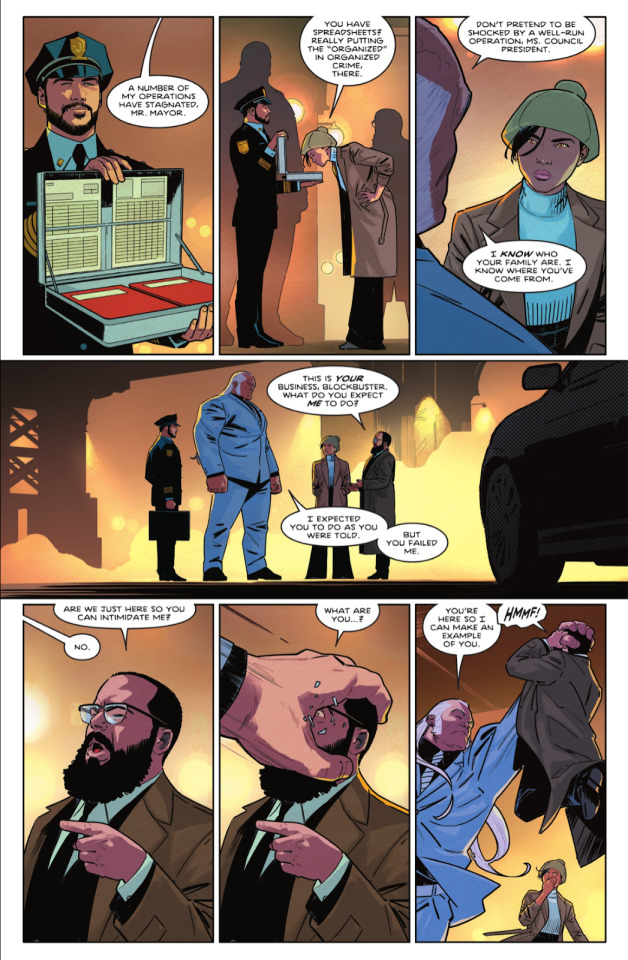
(Taylor, Tom, writer. Redondo, Bruno, illustrator. Leaping into the Light Part Two. Nightwing: Rebirth. 79, e-book ed. DC Comics, 2021. pp 14)
We can see this also through the dialogue of the story. For example, in #81, Melinda gets sworn in as mayor and Blockbuster’s men, in order to demonstrate the power they have over the politicians in the city, give her a suitcase full of money as a representation of the bribes that will be coming Melinda’s way.
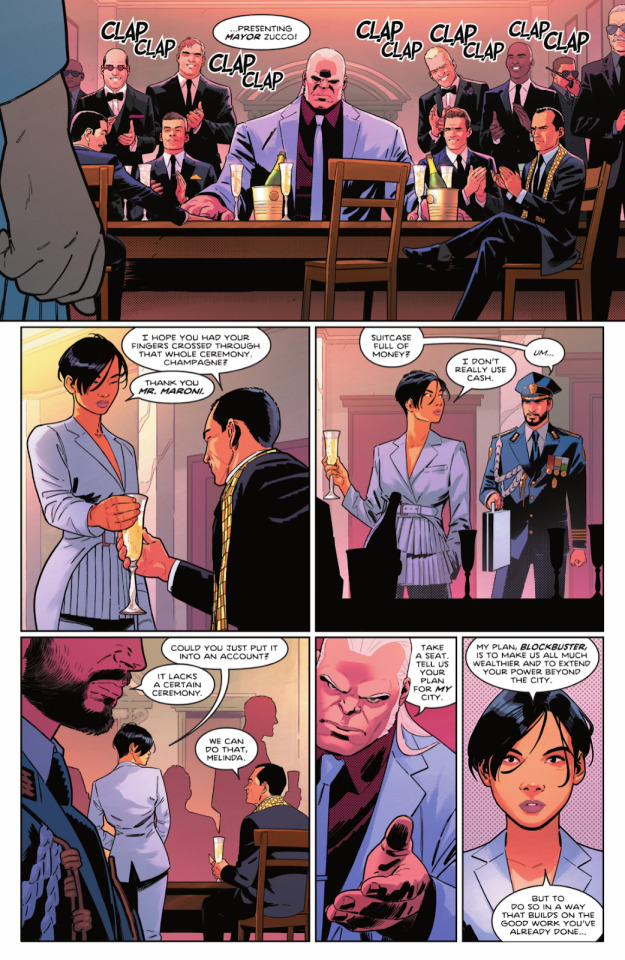
(Taylor, Tom, writer. Bruno, illustrator. Leaping into the Light Part 4. Nightwing: Rebirth. 81, e-book ed. DC Comics, 2021. pp 04)
Melinda, in order to continue her work undercover, plays into that by stating in a line that is as devoid of personality as it is of subtlety that, as mayor, she will make them all wealthier.
Similarly, in #83, Blockbuster states (also with little personality and little subtlety) that he owns the courts, that he sees himself as entitled to Bludhaven, and that because of the power he yields, he sees himself as invincible.
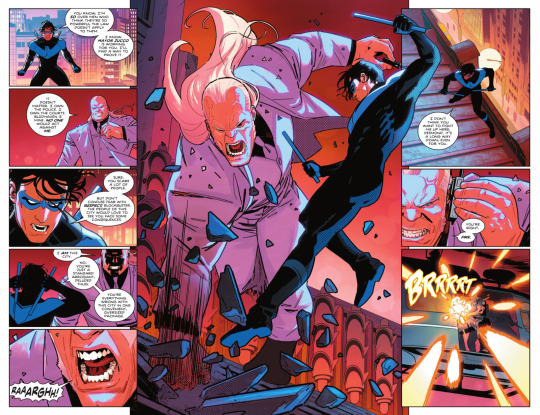
(Taylor, Tom, writer. Redondo, Bruno, illustrator. Leaping into the Light Part Six. Nightwing: Rebirth. 83, e-book ed. DC Comics, 2021. pp. 08)
Nightwing reaffirms this idea in that same issue when he says (also devoid of personality, subtlety, and this time charm or wit) that Blockbuster is “everything wrong with this city in one convenient, oversized package.”
This is what the conflict between Blockbuster and Nightwing is meant to symbolize — a struggle for the city’s future. Will Bludhaven continue to crumble under Blockbuster’s rule, or will Nightwing free it from his corrupt grip so that its citizens can finally have a chance to thrive? Even in the 1996 series, during both Dixon’s and Grayson’s runs, Blockbuster did not pose a threat to Dick’s morals or his world view. He did not make Dick question the way he saw people. Blockbuster’s targeting of Dick Grayson and his loved ones demonstrates how those with privilege go after the people who are fighting for change. Dick’s exhaustion and hopelessness mimics the same sense of helplessness one feels when it seems like the entire world is against you and the consequences for doing what is right can seem too great of a price to pay.
For this reason, Blockbuster does not need to be complex. He does not need to be sympathetic. But he does need to be powerful, threatening, and ruthless. He must push Dick to the edge, to make it seem like all it is lost, and in turn, when Dick finally pushes through and wins, it is a victory on both a personal and a societal level.
And this is where Taylor fails miserably.
Now, I have stated previously how, despite Taylor’s attempts, his rendition of Blockbuster comes off as flatly incompetent rather than threatening. I have discussed this under the context of how it influences the way Dick’s and Bludhaven’s portrayal. Now, I wish to dig deeper into this issue.
We are told of countless attempts on Dick’s life, but the only ones shown are overcome by Dick and his allies with ease. Either that, or the tension is undermined by a one-line joke or a general tone of casualness that fails to properly convey the stakes of the moment. Any threat that could have been created with Haley’s kidnapping or any intimidation tactic is destroyed by the gimmicky nature of the issue. This makes Blockbuster less of a threat.
And yet, we are told by Wally that Dick is stressed and overworked. But because there is not a lot of tension on screen, that telling rings hollow. The reader is not shown that Dick is overworked, and he is not shown truly struggling alone against the obstacles he does face, so this idea of Dick coming apart at the seams because of Blockbuster is not something the reader gets to truly experience. As a result, it often appears that Dick is coddled by his loved ones as everything always ends up alright with little effort made on their part. Rather than witnessing true danger take a toll on Dick, we are simply told this is something that is happening.
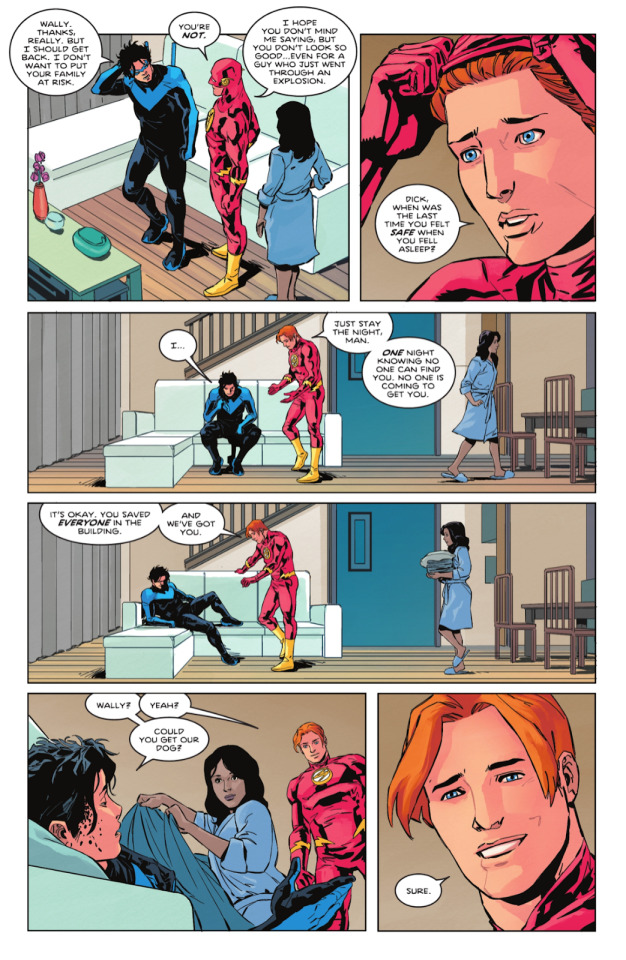
(Taylor, Tom, writer. Redondo, Bruno, illustrator. Get Grayson Act Three. Nightwing: Rebirth. 90, e-book ed. DC Comics, 2022. pp 16)
By comparison, when Grayson first wrote this same story nearly twenty years ago, she made it carry weight. She made it have consequences. While Dick was already coming apart from a myriad of different stress factors that unfolded on screen (overworking himself as Nightwing, as a police officer, saving Amy from Deathstroke, being fired from his job, Babs breaking up with him, and finally the circus fire), it was the explosion that made Dick fall apart, serving as the catalyst for his downward spiral. As Dick hunts down those Blockbuster employed, the readers get to see Dick’s exhaustion, Dick pushing himself to his limits, sleeping on fire-escapes while wearing his Nightwing uniform because he cannot bring himself to stop.
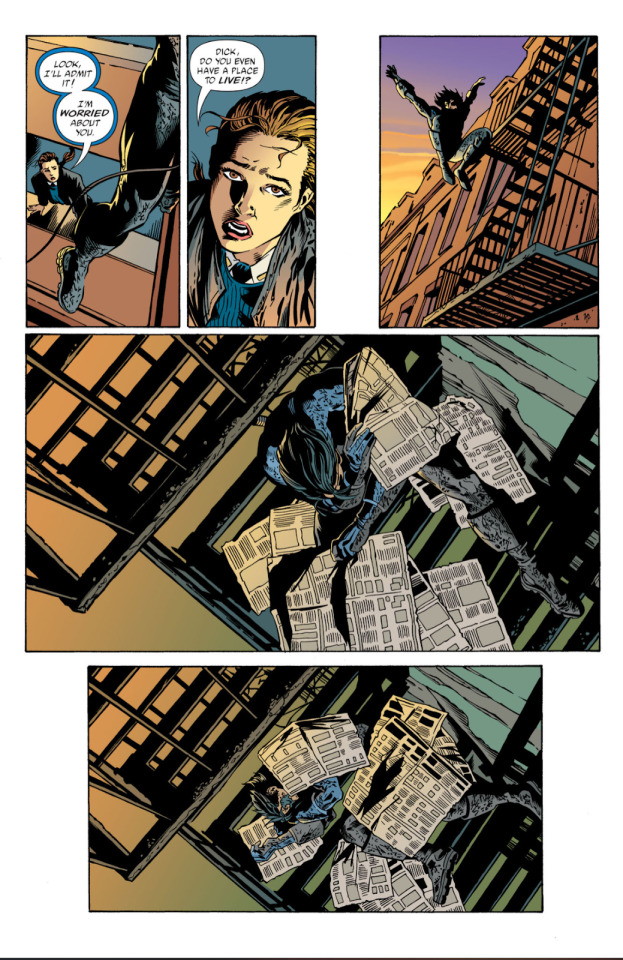
(Grayson, Devin, writer. Zircher, Patch, illustrator. Rekindle. Nightwing no 91, e-book ed. DC Comics, 2004. pp. 15)
Similarly, when the Judge returned to Bludhaven in The Untouchable, we see Dick keeping count of the bodies he left behind, we see Dick push through a bullet wound and beatings, we see him chase the Judge restlessly while neglecting his personal life. In both cases, we see the consequences of what Dick’s failure means, we see him struggle with those outcomes, we see what is at stake if Dick loses. And that, in turn, makes us not only care, but become invested in his success.
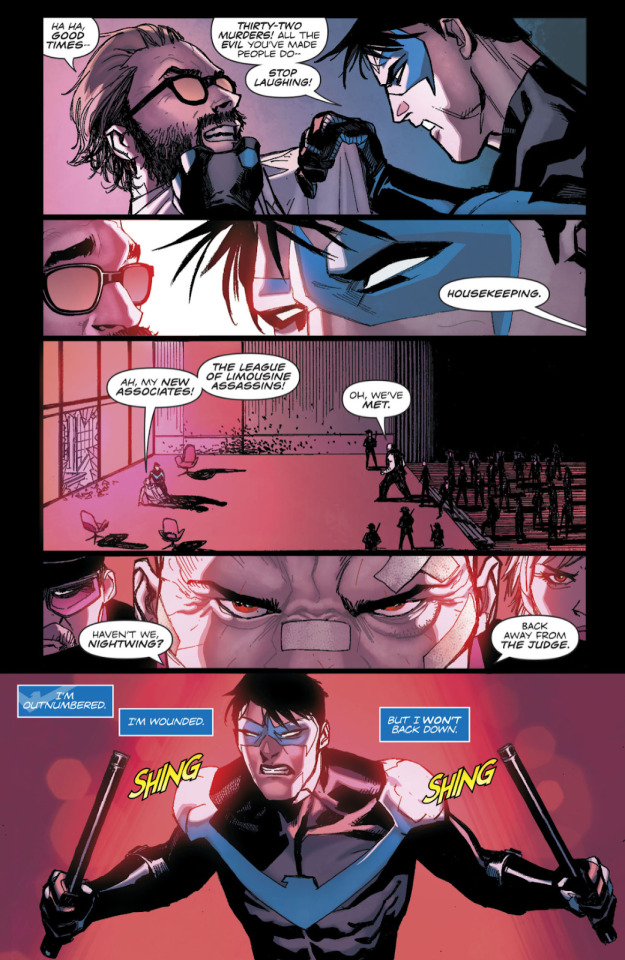
(Humphries, Sam, writer. Chang, Bernard, illustrator The Untouchable: Chapter Four: Infiltration. Nightwing: Rebirth no. 38, e-book ed. DC Comics, 2018. pp. 19)
By contrast, in Taylor’s run we never see any of that danger, and the few times we are presented with some threat, the conflict is handled with laughable ease. Blockbuster’s plots are foiled without Dick ever needing to do much of anything as he mostly relies on others to come to his aid. In this Nightwing solo series, the Titans, Batman, Robin, and Batgirl often do much of the hero-ing. Rather than putting the spotlight on Dick as a hero, Taylor lets others take the center stage, making this into an almost ensemble book. Because of this, the idea of Dick being near a breaking point, exhausted, and feeling unsafe wherever he goes is not supported by the narrative. By not giving Blockbuster a win, Taylor undermines the story he is attempting to tell.
This continues on through Nightwing #91. While Wally and Dick’s friendship were portrayed rather nicely, the villain that Taylor so ominously built up is taken down with an ease that is devoid of tension. The villain who is supposedly so good they’ve kept their existence a secret from Batman himself is quickly undermined by Taylor’s unwillingness to have his characters struggle.
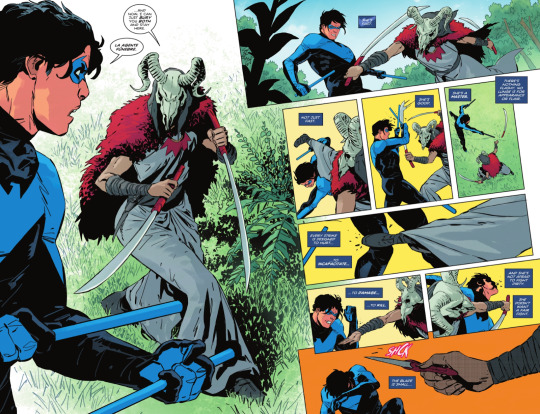
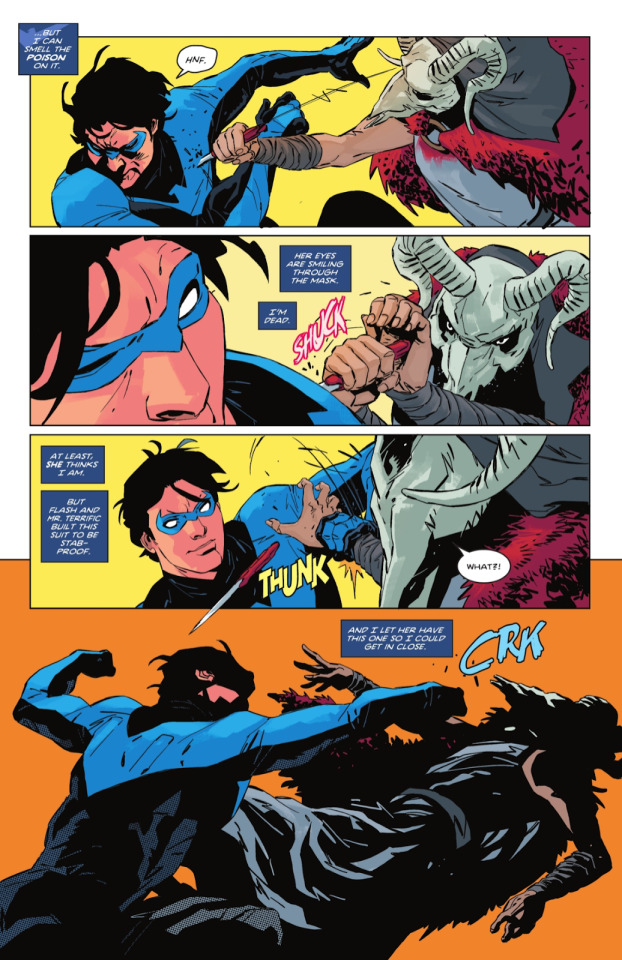
(Taylor, Tom, writer. Redondo, Bruno, illustrator. Get Grayson Act Three. Nightwing: Rebirth. 91, e-book ed. DC Comics, 2022. pp 16-17)
Besides the poor execution of his plans, however, it must be stated that Blockbuster’s plans and his motivations are poorly developed. Again, I’m not saying that Blockbuster needs to have a single sympathetic aspect to his character, but he does need to be threatening, and he must have some internal logic. Looking at the story Taylor has created, I wonder… Why does Blockbuster care that Dick Grayson created the Alfred Pennyworth Foundation? Why does he care about the creation of Haven? I understand that Blockbuster is meant to be a corrupt crime boss who wants to retain control of the city, but how does Dick building Haven interfere with his plans? Why was one billionaire throwing his money around to help homeless youths a bleep in his radar? Blockbuster already has politicians and the police force in his pocket while Bludhaven’s systems were constructed to benefit him and those who endear themselves to him. So why is he so focused on destroying Dick Grayson and not Nightwing?
I am trying to restrict my comparisons to DC Comics media, but in this, I cannot help but think of President Snow’s portrayal in the Hunger Games movie adaptations. In a movie-only scene, President Snow tells Seneca Crane about the importance of having a winner in the games. He explains how it is about letting the people have hope. As he put “A little hope is effective, a lot of hope is dangerous. A spark is fine, as long as it's contained.”
In other words, giving the people a spark of hope to keep them distracted can help prevent mass mobilization required to disrupt the system. Give them a goal to focus on, and you can redirect their attention. It would, then, be far more sinister and make far more sense from a narrative standpoint if Blockbuster allowed Dick to focus on his one project so that instead he would not turn his attention to Blockbuster. Perhaps he could have attempted to manipulate the project from within, folding it into Bludhaven’s corrupt social systems. Dick would have been that little spark that Blockbuster could have cultivated, giving the people of Bludhaven "hope" so that they would focus on that and not on what is going on behind the scenes. The narrative arc, then, would focus on Blockbuster failing to contain the spark as Dick became the flame that breathed true systematic change.
I do not want to dwell too much into fixes, as I merely wished to analyze Taylor’s run and not to go full on script-doctor and rewrite the entirety of his story. Rather, I just wished to use that as an example of how Blockbuster does not have sound plans or internal logic, and that, too, contributes to how his character comes across as incompetent and nonthreatening, and as a result, even his supposed ruthlessness is undercut.
Taylor’s Blockbuster does not have a concrete goal. He wants power and money, yes, but for what purposes? And how does he acquire said power and money? Why is he threatened by Dick Grayson’s personal project? How are his intimidation tactics challenging Dick in an interesting way? How are Blockbuster and Nightwing meant to narratively play off each other? How are Taylor’s Blockbuster tactics any different from a generic villain with any other name?
To be fair to Taylor, I do not believe Dixon managed to fully nail this part of Blockbuster’s character. I did not find Dixon’s writing of Blockbuster to be a particularly compelling part of his run. However, Dixon countered this lack of substance by leaning into what Blockbuster was meant to represent — the system inside the machine that allowed evil to flourish. Blockbuster’s influence may have been everywhere, but Blockbuster himself was hardly ever confronting Nightwing directly. Dick was fighting a war on multiple fronts, and while he could stop an enemy on his right, two more appeared on his left. The way the struggle between Blockbuster and Nightwing played out during Dixon’s run emphasized why protecting Bludhaven was so difficult — because there were so many immediate crises that needed to be dealt with on the surface, it was difficult to get to the root of the problem.
This was why, during Dixon’s run, Blockbuster could remain a threat even if he would remain unseen for long stretches of time. And this was why when Dick stopped one of the underlings, Blockbuster himself could remain an intimidating force. Blockbuster’s machinations were varied — some of his plans targeted Nightwing directly; others Dick only stumbled upon when investigating a matter he believed to be unrelated. Furthermore, the limited number of allies and the prospect that Blockbuster could only be taken down for good once his grip on other institutions of power and influence were weakened emphasized just how this was no ordinary fight, but rather a mission requiring Dick to operate on multiple fronts and strategize on a long-term basis.
Taking down Blockbuster was a multi-step process. Each of said steps offered their own challenges and opportunity for storytelling, for fleshing out Bludhaven, and for allowing Dick to grow as the protagonist of the story.
Dixon’s approach to Blockbuster requires Blockbuster to stay in the background, looming over the city as Dick fights his way forward. It’s why he remains present for all 70 issues of Dixon’s run without undermining Dick’s competence or his dedication to his city — as a stand-in for corrupt power, Blockbuster himself is not an immediate threat even if he is the powerful underlining one. Dick must constantly fight others in order to eventually be able to fight Blockbuster. To borrow video-game terminology, Blockbuster is the final boss, and Dick must first go through a myriad of levels and smaller enemies before he gets to finally take down Blockbuster for good.
It was Grayson who made the conflict between Dick and Blockbuster personal and, as a result, far more sinister. After the death of his mother in a car pile up caused by Nightwing’s activities, Blockbuster was determined to get his revenge on Nightwing. After finding out Nightwing’s civilian identity, Blockbuster came up with a chilling plan that was specifically made to destroy Dick from the inside out. Blockbuster understood that Dick did not value his own life, but rather, those of the people around him. And so, he decided that rather than killing Nightwing, he would instead kill everyone around Dick, tormenting and terrorizing him until he felt as if he were poisonous. What was so poetic about this strategy was that it mirrored what, in Blockbuster’s eyes, was Nightwing’s biggest sin: the danger he imposed on others through his actions which resulted in the death of Blockbuster’s mother.
As you can see, in this scenario, Blockbuster has become more of a proper character rather than just a stand in for corruption. That is not to say that wielding power for self-serving purposes at the expense of others isn’t a factor in his character during Grayson’s run, but rather that while Dixon’s Blockbuster was more of an embodiment of an idea, Grayson’s was more human, with more personal motivations. One approach is not inherently better than the other, they simply lean towards opposing sides of the spectrum, and that affected the type of story told and the type of confrontation Dick and Blockbuster had during their runs.
Because Grayson took a more personal approach towards Dick and Blockbuster’s dynamic, she also fleshed out their relationship to the point that it was not generic. Blockbuster’s campaign of terror against Dick was intimate, for it was something that could only have played out between these two characters. And while Dixon laid out the groundwork to build Blockbuster into a threatening figure by the time Grayson took over the title, Grayson’s strategy to have Blockbuster go after those around Dick allowed her to have Dick win and lose simultaneously.
Blockbuster starts his campaign of terror slowly. First, getting Tarantula to contribute to Dick and Babs’ breakup. While she is not the sole reason why they break apart — they are shown to have had some tension long beforehand that comes from incompatible personalities and desires — she does become a factor in their falling out. This ends up isolating Dick even further, who was already stressed due to the fact he lost his job once his boss and superior Amy discovered he was Nightwing.
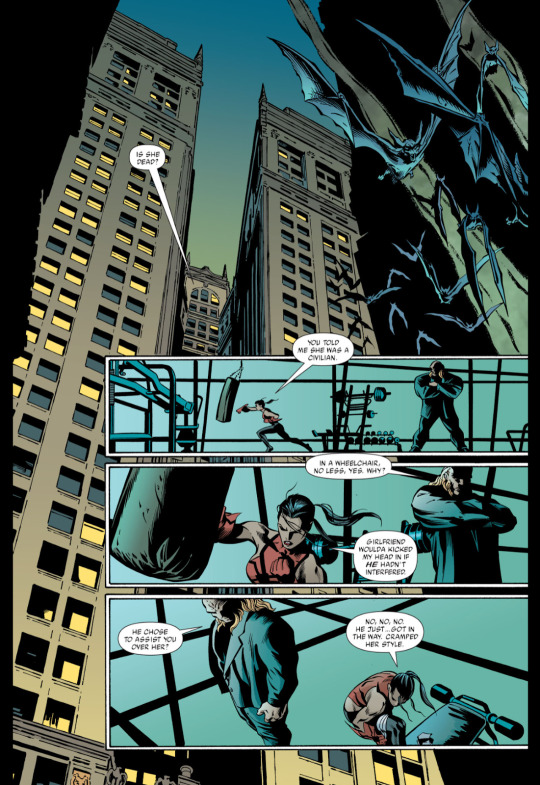
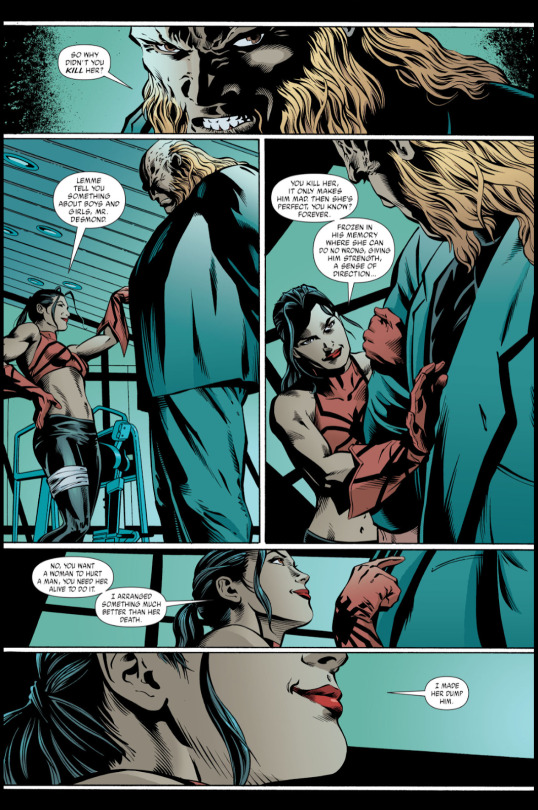
(Grayson, Devin, writer. Zircher, Patch Snowball. Nightwing. 87, e-book ed. DC Comics, 2003. pp 17 - 18)
Then, Blockbuster strikes closer to home by hiring Firefly to set fire to the circus Dick grew up in. While Dick was able to save many people who were inside the tent (and had his own life saved by Zitka), over twenty people lost their lives in this incident.
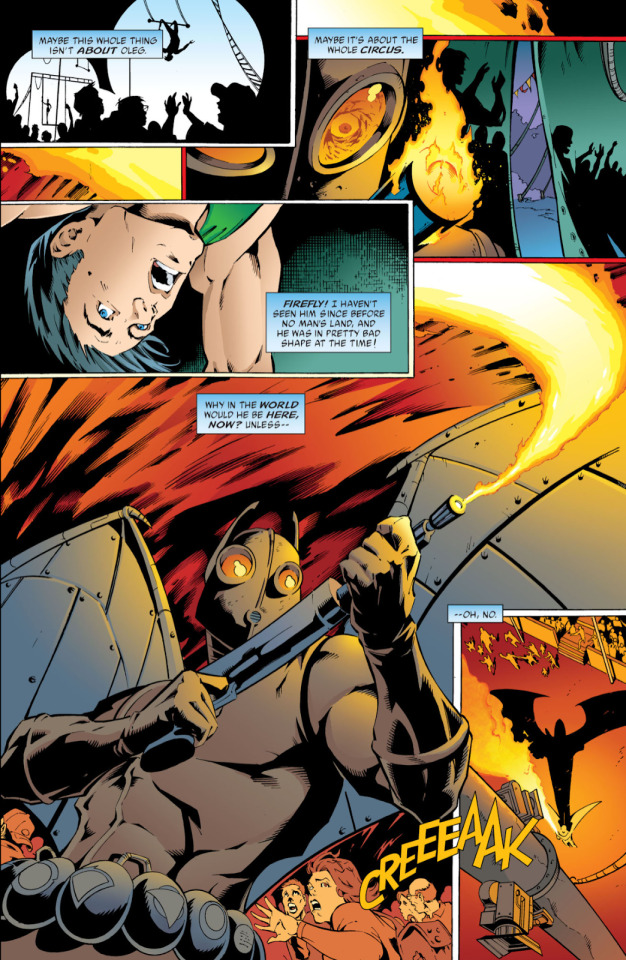
(Grayson, Devin, writer. Davis, Shane, illustrator. Flurry. Nightwing no 88, e-book ed. DC Comics, 2003. pp. 16)
While that certainly worked in breaking Dick’s spirit, it wasn’t until Dick’s building exploded that he realized this was a targeted attempt to get to him. All of those innocent people died not because Blockbuster was trying to kill Dick, but rather, because Blockbuster knew that their deaths would destroy him.
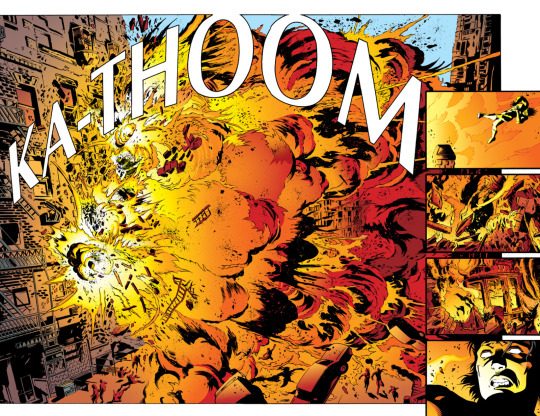
(Grayson, Devin, writer. Zircher, Patch, illustrator Avalanche. Nightwing no 89, e-book ed. DC Comics, 2004. pp. 12)
What follows is a downward spiral that demonstrates just how thoroughly Blockbuster is able to break Dick. Even as Dick gains new ground by taking out some of Blockbuster’s hired assassins, the threat still looms over him. And even when it seemed like Dick finally found a way to take down Blockbuster for good, that hope is snatched from him. The anger and helplessness Dick experiences in this moment truly speaks to the same feeling many of those who stand up against their oppressors feel whenever they are faced with setbacks in their constant battle.
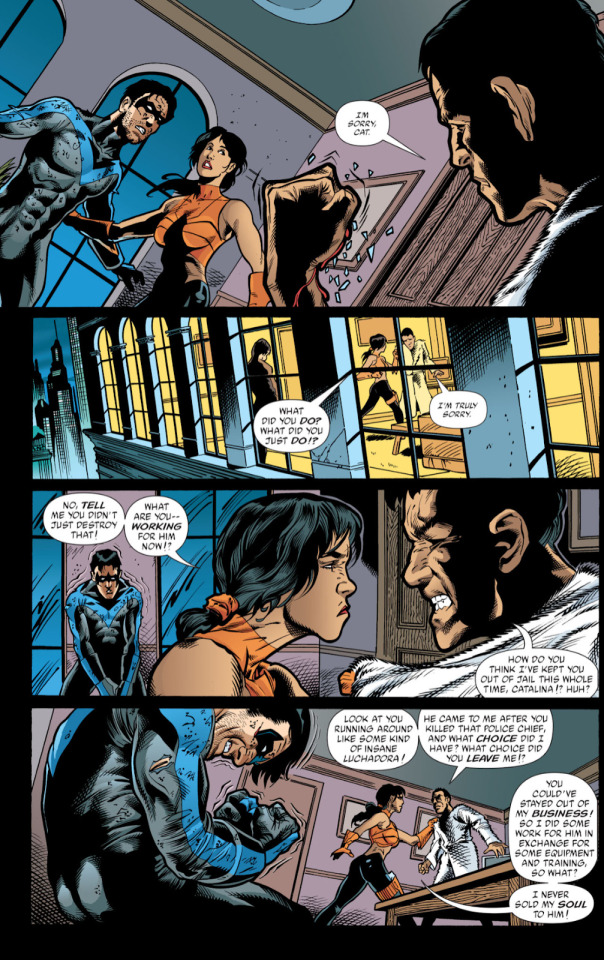
(Grayson, Devin, writer. Garcia, Manuel, illustrator Flashpoint. Nightwing no 92, e-book ed. DC Comics, 2004. pp. 21)
The carnage continues. The reporter who had uncovered Nightwing’s identity and just so happened to be standing next to Dick is mercilessly shot dead in front of Dick’s eyes.
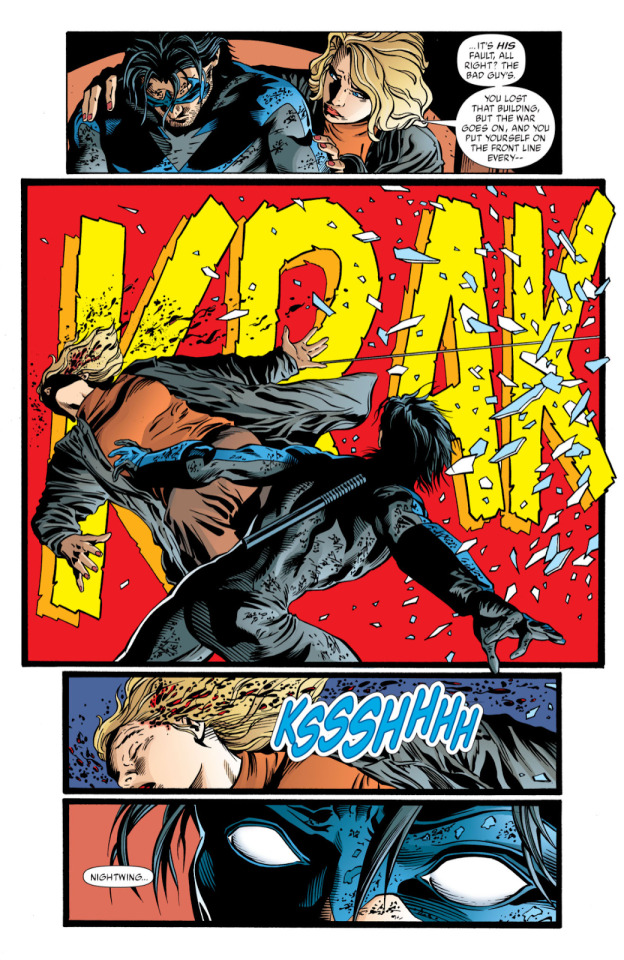
(Grayson, Devin, writer. Zircher, Patch, illustrator. Slowburn. Nightwing no 93, e-book ed. DC Comics, 2004. pp. 07)
And as Blockbuster chases Dick down, putting others in harm, we can see as Dick tries to protect innocent people around them that Blockbuster will not stop. He will not rest.
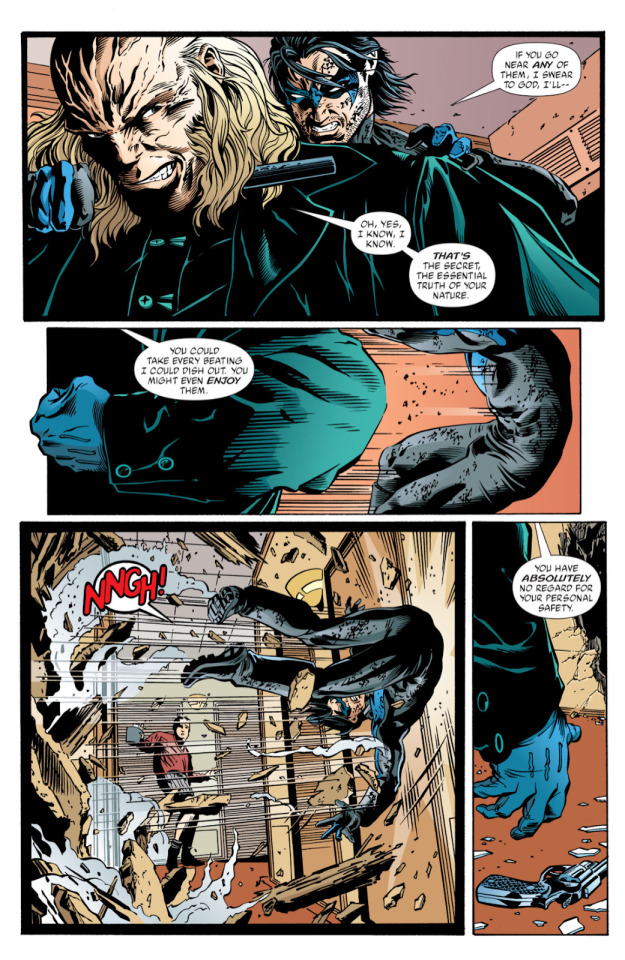
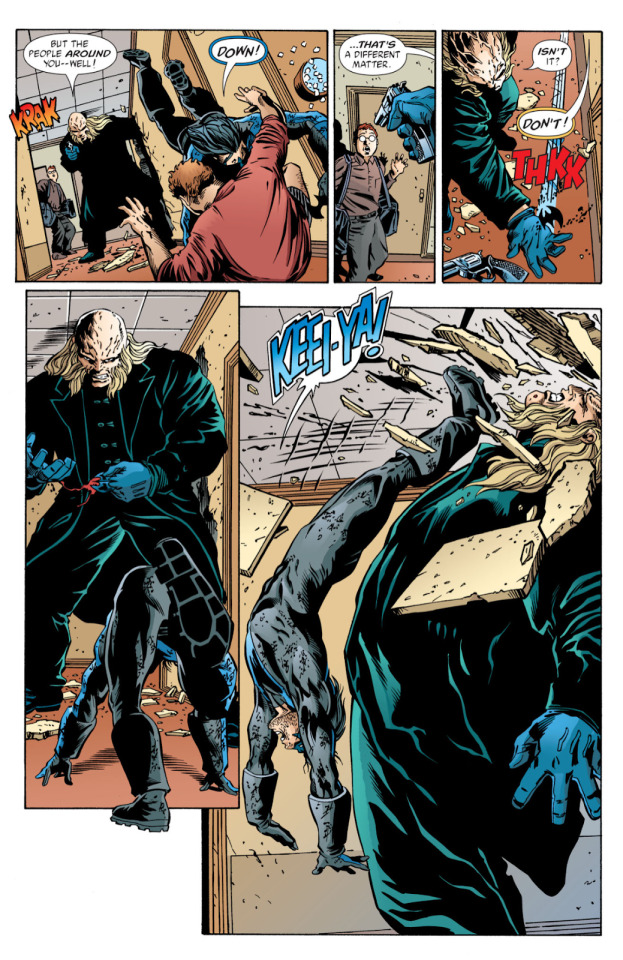
(Grayson, Devin, writer. Zircher, Patch, illustrator. Slow Burn. Nightwing no 93, e-book ed. DC Comics, 2004. pp. 10-11)
Blockbuster says it himself in a speech where he lays out exactly what his plans for Dick are. Dick is at a breaking point. The enemy, huge and impossible to overcome, towers over him. As the climax reaches its crescendo, Blockbuster asserts his power by mocking Dick and laying out a future in which Dick can never escape this hopeless terror. This city belongs to Blockbuster. Dick is powerless. There is no winning.
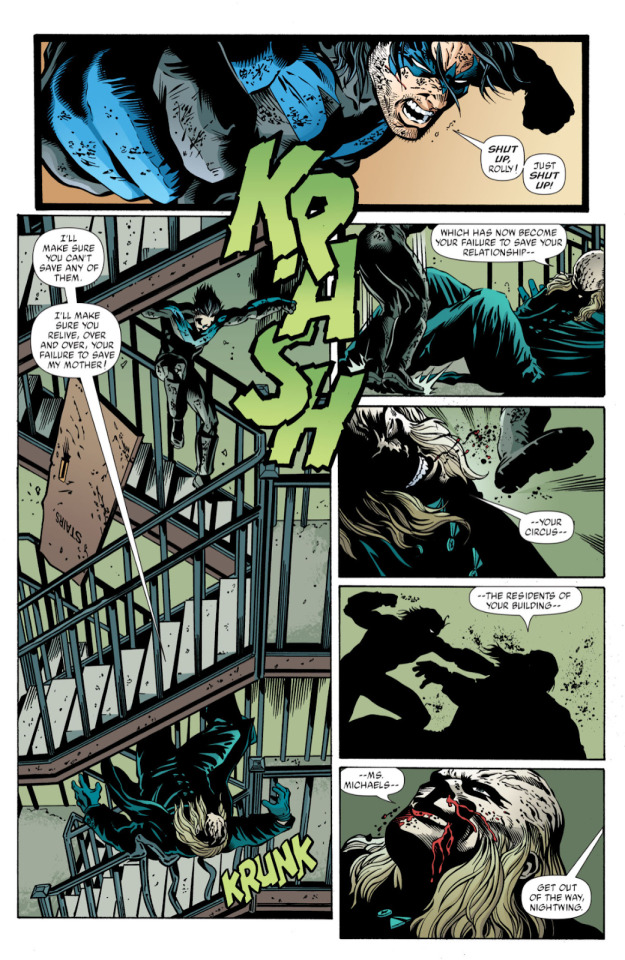
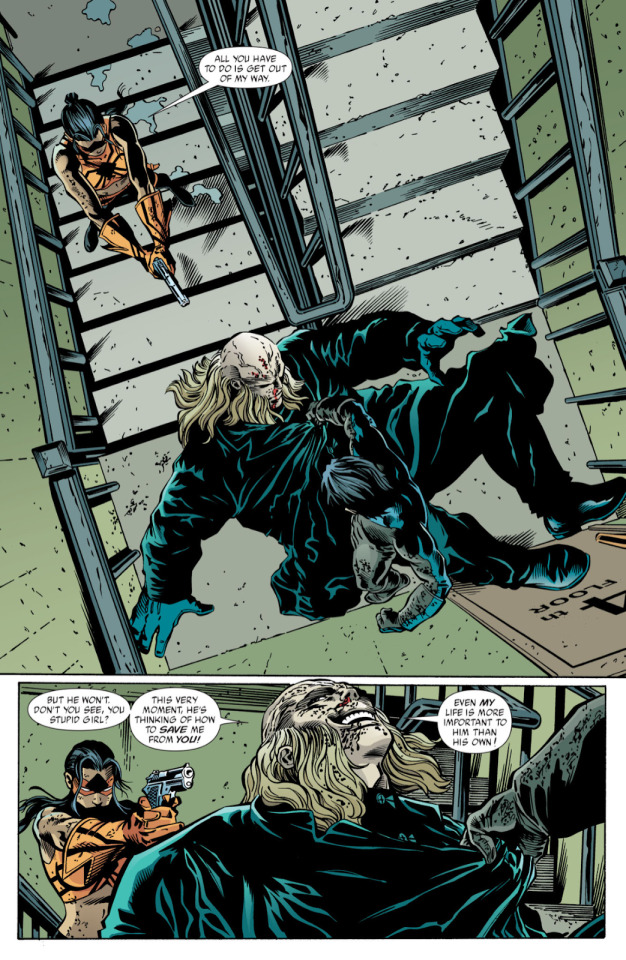
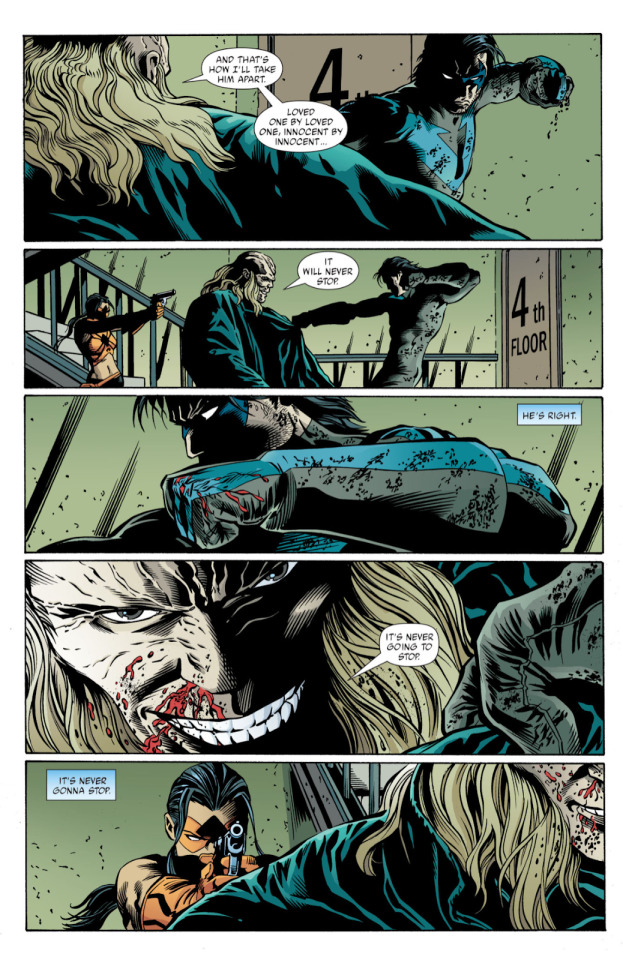
(Grayson, Devin, writer. Zircher, Patch, illustrator. Slow Burn. Nightwing no 93, e-book ed. DC Comics, 2004. pp. 13 - 15)
This speech is visceral. Personal. Evocative and filled with character and emotion. These words could not have been uttered by anyone else but Grayson’s version of Blockbuster. And they could have not been directed at anyone but Dick at this very moment. This speech has specificity that was purposefully crafted to raise the tension of this moment to its fullest potential.
By comparison, Taylor’s “I am this city” line is generic. Like much of his dialogue, it lacks character — nothing about what Blockbuster says feels distinctive to him. Nothing sets it apart from how other characters speak in Taylor’s world, and nothing about it is unique to this particular confrontation. Even the way he bangs his hands on the ground like a toddler throwing a tantrum (and resulting in Dick’s second unmasking in this run) is childish and undermines the tension of what is meant to be a climatic moment.
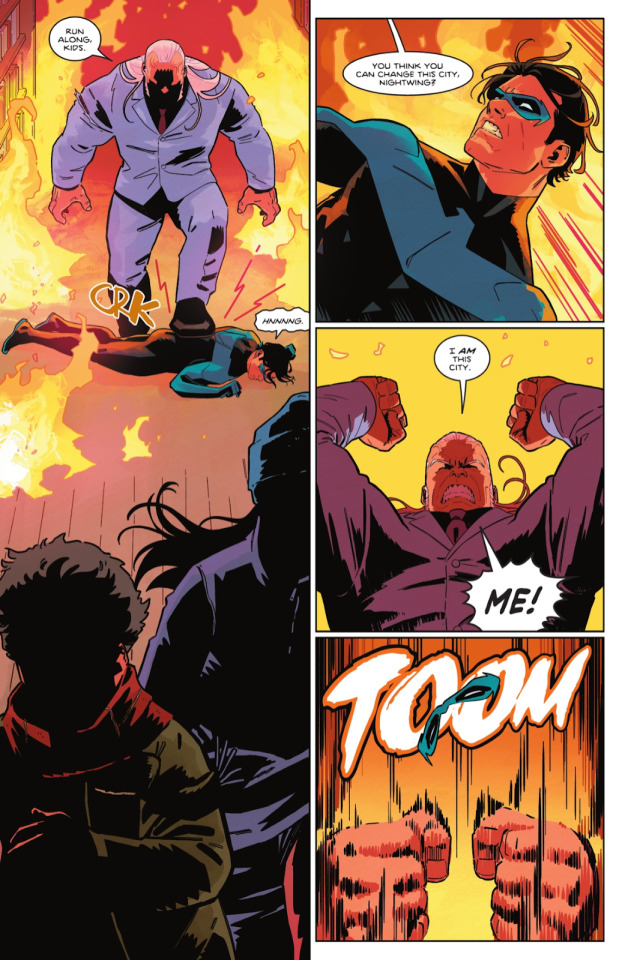
(Taylor, Tom, writer. Redondo, Bruno, illustrator. The Battle for Bludhaven’s Heart Part Four. Nightwing: Rebirth. 95, e-book ed. DC Comics, 2022. pp 20)
The themes in Grayson’s run are not the same as the themes in Taylor’s run. However, Blockbuster still invokes the threat of an oppressor. By isolating Dick from his support system, his terror and the helplessness it generates are intensified. Rather than making Dick question his own morality, he makes Dick doubt his abilities to be a hero.
While Dixon used Blockbuster’s intimidating build and power to explore the ways in which systematic corruption is responsible for the immediate evils we encounter in everyday life, Grayson used those very same characteristics to explore how one copes with being oppressed on a personal scale. Grayson’s Blockbuster pushes Dick to the darkest place he’s ever been, and the aim of her run was to see how he would be able to put himself back together again after he lost faith in his ability to make a difference.
Those two runs demonstrate how Blockbuster’s grip on power can be used to oppose Nightwing in two very different ways. Dixon’s approach requires Blockbuster to stand at a distance, the unseen machine that Dick will have to eventually destroy. This allowed Blockbuster to remain Nightwing’s main opponent for all 70 issues of Dixon’s run without ever calling into question Dick’s competence or his dedication to his mission as Blockbuster, the themes he embodied, and the struggle Dixon built clearly signaled that, no matter how great Nightwing was or how much he might wish to do so, the circumstances were not at a point where Dick could take on Blockbuster and succeed. By contrast, Grayson shifted Blockbuster from a long term, simmering threat to an immediate and personal one. This, though, also meant that the conflicts in Grayson’s run were more internal than those of Dixon’s. While Blockbuster was the enemy, the true antagonistic force that Dick would be forced to battle throughout Grayson’s run was Dick’s depression, his self-loathing, and his self-doubt. For this reason, rather than standing in the background while others did his bidding, Grayson’s run pushed Blockbuster to center stage. As he became an urgent threat who was costing people their lives every minute he roamed around free, apprehending him was no longer something Dick could afford to create a strategy around — it was something that demanded prioritization.
Nearly twenty years later, Taylor’s attempts to merge these two approaches only serves to lessen Dick’s competence and Blockbuster’s threat. Like Dixon, Taylor uses Blockbuster to represent, as it was plainly stated in his run, everything that is wrong with Bludhaven – the men in power who “have everything and still want to take more.”
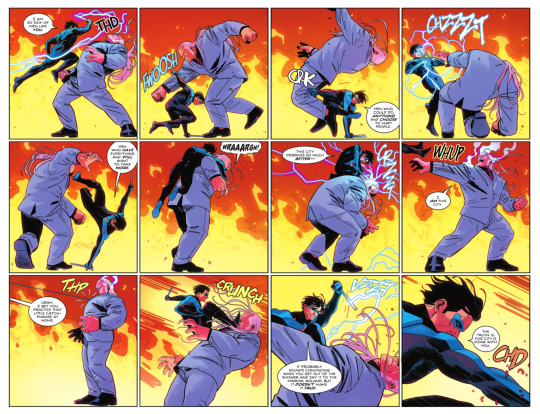
(Taylor, Tom, writer. Redondo, Bruno, illustrator. Battle for Bludhaven’s Heart Finale. Nightwing: Rebirth. 96, e-book ed. DC Comics, 2022 pp. 08)
And yet, it is Grayson’s plot beats that he copies by having Blockbuster personally target Dick in a myriad of unsuccessful ways.
While Grayson’s Blockbuster targets Haly’s Circus, Taylor’s Blockbuster targets Dick’s dog, Haly. While Grayson’s Blockbuster successfully kills Dick’s neighbors, Taylor’s Blockbuster fails to kill Dick’s neighbors thanks to Melinda and Wally’s intervention.
Because of this personal persecution, Blockbuster becomes Dick and his allies’ priority. However, because Taylor’s Blockbuster’s actions never have any negative consequences; because the humorous tone is always undermining the tension; and because the reader does not get see Dick struggle or fail against Blockbuster’s attempts the way he does in Grayson’s run, Blockbuster’s does not come across as the larger than life villain he is meant to be. Rather, his constant failures, his generic dialogue and unclear motivations, and his straightforward intimidation tactics make him more into a fumbling fool whose powerful position is incidental rather than the result of merciless oppression.
And yet, he becomes Nightwing’s priority. Thematically, Taylor’s Blockbuster is meant to imitate Dixon’s, but the narratively he acts like Grayson’s Blockbuster. This makes it so he is more of an immediate threat than Dixon’s villain, but less effective in his terror tactics than Grayson’s.
With the consequences of Blockbuster’s crimes being non-existent plot-wise, the stakes of the plot are never elevated. Blockbuster’s threat remains abstract because in Taylor’s run, everyone who is not an explicit bad guy has plot armor so thick that they cannot be forced into an uncomfortable on-screen situation for more than two or three pages at a time.
The clashing of theme and plot create enough of a dissonance as it is, but the presence of Heartless, who is actively and brutally murdering people and leaving children orphan, only deepens the problem. Heartless’ gory crimes not only overshadow Blockbuster’s failed assassination attempts, but the sheer amount of people who have fallen victim to his deeds creates an urgency and a tension that demands to be resolved.
Though Dick is aware of Heartless' existence, he does not make the serial killer his priority. When Grayson made Blockbuster’s threat more immediate and Dick became aware of the rising body count, stopping Blockbuster became his sole focus, to the detriment of his own health. Dick’s obsession with catching Blockbuster at all costs helped add to that intimidating aura around him.
Humphries understood this when crafting the dynamic between Dick and the Judge in The Untouchable. Heroes and their villains have a symbiotic relationship. When the Judge kills people in brutal ways, Dick jumps into action and stops at nothing until he catches him. This shows the audience that the Judge is a threat to be taken seriously, and it shows Dick to be a hero who will always put others first. When Dick fails to take the same approach with Heartless and instead focuses on Blockbuster, Dick comes across as an incompetent and self-centered.
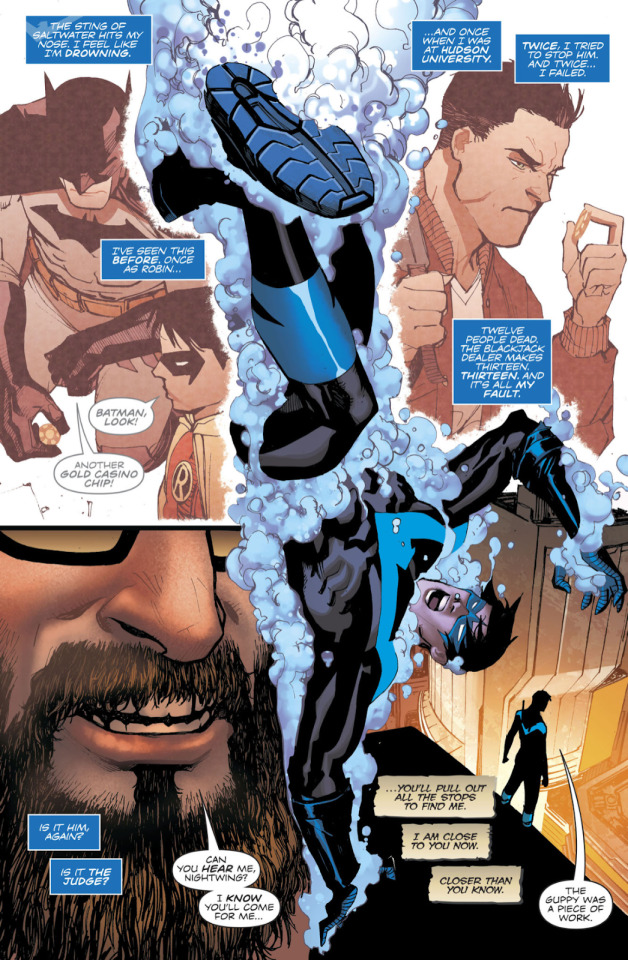
(Humphries, Sam, writer. Chang, Bernard, illustrator. The Untouchable: Chapter One: Hunter. Nightwing: Rebirth no. 35, e-book ed. DC Comics, 2018 pp. 20)
At this point, one might be wondering why high stake conflicts and ruthless villains are even needed in a Nightwing comic. I have seen many people defend Taylor’s writing by claiming that they enjoy the fact that it has no tension. They like the easiness of it, the slice-of-life nature of his storytelling. And while even his slice-of-life writing is not really my cup-of-tea, I can understand this sentiment. Taylor seems to truly enjoy writing the more sitcom-aspects of Dick and Babs’ life together. It is not the fights, the mystery, the intrigues, the nuances of living a double life that interest him — it’s the taking care of the rescue puppy, the sharing of a pizza in the park, the two childhood friends finally getting to live an idealistic millennial adult life together without having to worry about everyday problems like work, rent, family troubles, or disagreements. He thrives when writing stories that remain static, with simple episodic plots that never truly lead to character development or a change in the status-quo. He excels in quippy yet straight-forward dialogue where things don’t need to be taken seriously.
And to be clear, I don’t think that is a bad thing. I don’t think slice-of-life or sitcoms are a lesser art form than dramas or action series. Like many people, I too, have been comforted by that type of entertainment. I, too, find escape in those sorts of stories. I daydreamed about a life where I could just enjoy time with my friends without thinking about work, where the worst problem I face is how to avoid going to a party without appearing rude. Those stories have value, they have their place in our culture… But Nightwing's solo series is not that place.
Now, this will probably be the one of the most controversial things I will say in this entire essay, but despite my love for Nightwing, I do not believe that the Nightwing mantle is Dick’s ultimate true form.
In DC Secret Files: Nightwing Secret Files #1, Dixon explores the aftermath of Dick being fired as Robin by having Dick confess, with a certain amount of shame, that he always thought that he would eventually become Batman. Bruce understood that and he was preparing Dick to be his successor. Losing Robin, then, means losing any certainty Dick has for his future. Suddenly, he is adrift, not only having lost Robin, but also Batman. And that’s when Clark tells him the story of Nightwing.
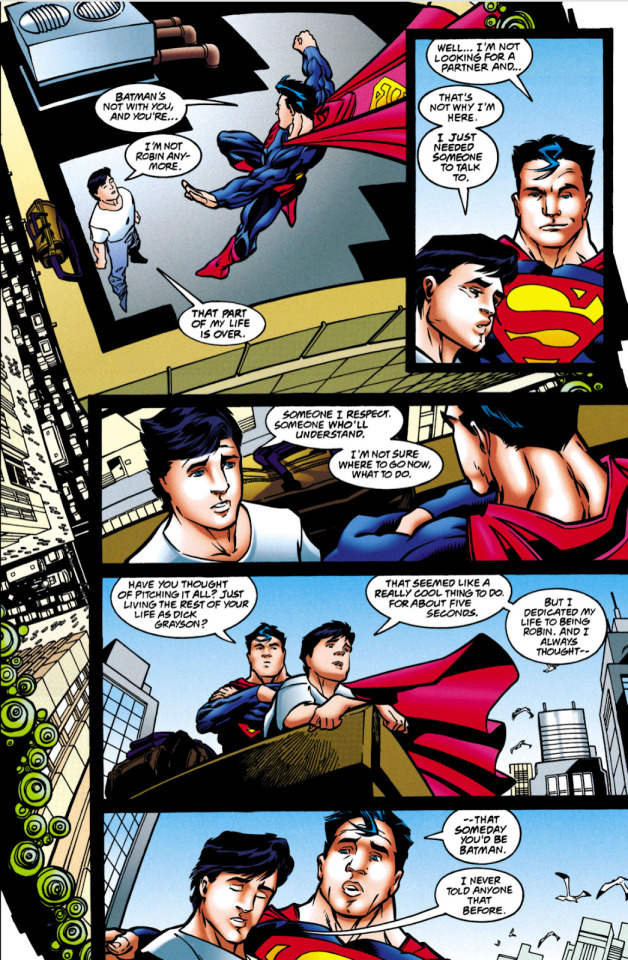
(Dixon, Chuck; Grayson, Devin; Peterson, Scott; writers. Ha, Gene; Scott, Damion; Land, Greg; Stelfreeze, Brian; Guice, Jackson; Eaglesham, Dale; Floyd, John; Jimenez, Phil; Brown, Eliot R.; McDaniel, Scott; Nolan, Graham; Rosado, William; Kuhn, Andy, illustrators. DC Secret Files: Nightwing Secret Files #1. DC Secret Files: Nightwing Secret Files #1 no. 01, e-book ed. DC Comics, 1999. pp 15)
Personally, I think there’s something really special about that idea. The Nightwing story grounded Dick during one of the most uncertain times in his life. Dick wanted Robin and Batman, but once both were taken from him, he created Nightwing as a way of coping with the trauma of having his identity, future, and certainty taken from him.
Braxi concludes his essay On Superman, Shootings, and the Reality of Superheroes by saying that “I don’t need Batman to end homelessness. I need Batman and Superman to provide moral and spiritual guidance to show us a better world is possible. I read Batman to transform trauma into will power.” (Braxi, Steve, “On Superman, Shootings, and the Reality of Superheroes” Comics Bookcase, September 2021)
The same, I believe, is true for Dick. As the character created to accompany Bruce and mirror him in as many regards as he foils him, Dick transforms trauma into power. He makes his own suffering a source of good.
As I said, I do not believe Nightwing to be Dick’s ultimate, truest form. I believe that to claim that Dick’s only happy ending is to have him be Nightwing not only diminishes the importance that Robin and Batman played in his life, but it also undermines what is so unique about Nightwing as a mantle.
Dick loves being Nightwing. Nightwing is an extension of who he is. But Nightwing is not the only happy ending Dick could have had, and to treat Nightwing as inevitable is to ignore the fact that Nightwing was born out of a trauma and a loss that could have been prevented had the circumstances that led to Dick losing Robin been different. Nightwing means transformation. He means change. Nightwing is a phoenix-like Kryptonian myth, raising himself from the ashes. But for the ashes to exist, a deadly fire must first occur. Nightwing, this great hero of light, can only be born out of pain. He can only arise from conflict.
This is one of the things that makes Dick so special. When he is overpowered, he does not give up. When he is hurt, he transforms that pain into power. No matter how many times he loses, no matter how many times he is lost, he always rises again, with a beautiful smile and an unwavering kindness that inspires others — including Superman, especially Batman — to do the same.
That is why a Nightwing story needs conflict. This is why he needs ruthless villains. That’s why a Nightwing story needs the occasional failure. Because it is only when we see Dick at his lowest that we also get to see him overcoming darkness, showing why he is the best of the best and why we love him so much.
35 notes
·
View notes
Note
If it's not too personal, would you mind sharing how you view Satan? Is it from a relatively Christian perspective (like i do)? if so, how do you see the Christian God in all this? What does each of them represent?
That's so complicated. Please accept this extremely long post about my personal theology. I didn't type it up for you but pasted it in from my files.
It is in constant flux and I update it regularly with new information. This is not the complete version, only the relevant parts to your question (I think). It is 5/22/2024 so if I learn something as the result of reactions to this absurd post, it will officially be out of date. You're allowed to reblog this and I accept constructive criticism as long as you're not an asshole about it.
With regards to gods generally, I believe that:
gods exist.
we don't really know if the gods are real or not, even if we believe in them or worship them or think they might exist. There is no objective truth to be found, only subjective perception and shared gnosis. Treating the gods as if they do exist, even as archetypes, can bring objective knowledge of one's self, the nature of the universe, and (most importantly) can bring meaning to a life that might otherwise feel devoid of it.
my belief in the gods exists in a half-agnostic, half-theistic middle ground of reasoned-yet-pious unknowing and positive nihilism.
belief in gods is not a good reason to ignore or reject science; the two are not mutually exclusive nor is one morally superior to the other.
gods are NOT "real" or "flesh and blood" being that inhabit other realms.
man made the gods. We invented (and continue to invent and re-invent) them through worship and myth-making.
the gods are given the powers and domains by the faith of those that believe in them (they are powerful, influential, and semi- independent egregores).
if there is a cosmic creator god that created the universe or started the Big Bang, it is not invested in the least in what humanity is doing and thus doesn't care if we worship it or not, so we might as well not.
the gods either ARE their domains (when it comes to natural domains such as "water" or "lightning" or "death") or have some measure of control over their domains (human constructs such as "music" or "motherhood" or "law"), but the line there is really thin and open to a hell of a lot of debate.
there are gods that are invested in humanity and that actively respond to attempts to build relationships with them.
there are gods that accept physical and symbolic offerings as well as "actions as offerings" and that respond by bestowing favor on the worshipper in the form of blessings (the Gifting Cycle).
according the their own myths, the gods are not wholly benevolent, but have their own ambiguous and independent wills. They chose when and why to answer prayers, if at all.
no god is stagnant. Gods change with time and with people's changing beliefs about them. The gods of ancient people remain powerful but the beliefs surrounding them have morphed and changed over time, creating newer versions of the same old gods.
because no god is stagnant, it's impossible to worship the exact same god as my ancestors even when they are called by the same name. Too much knowledge has been lost, and the culture surrounding me and the gods in question have shifted and changed dramatically.
ancient polytheists incorporated new ideas and myths into their worldviews all the time and were not jealous of other gods/pantheons - in fact, many gods were "adopted" into pantheons or syncretized into becoming a part of one or more of their old gods.
other gods beyond those of my direct ancestral lineage are both worth worshipping and open to being worshipped (within reason and with appropriate consent of the spiritual traditions to which they belong).
engaging in the Gifting Cycle with people and gods/spirits I respect brings us into greater community with each other
With regards to the Christian God, I believe that:
a local god of the Canaanites, known as El, and gradually became conflated and syncretized with other related gods such as Yahweh, an early Israelite god of storms and warriors. This god became the god of the Jewish people. With time and differences in theology, a version of this god eventually became the god of the Christians.
the Christian God and the Jewish God are not the same god, in the same way Thor (Norse) and Thunor (Anglo-Saxon) are not necessarily the same, or Zeus (Greek) and Jupiter (Roman) are not necessarily the same. They share an origin and have a great deal of similarities and can be easily conflated, but Judaism perceives their god much differently than Christianity perceives theirs. Thus, references to the Judeo-Christian God are at best overly simplistic.
J!God's early insistence on monolatrism and later monotheism led to the violent displacement and literally "demonization" the other gods and spirits of the Levant. This continued into the C!God. As Christianity spread, this process was continued against the gods and spirits of the places where the C!God was carried by his worshippers and where they proselytized.
neither the J!God nor the C!God created the universe, this world, or humanity. No record of him exists until the Bronze Age and humanity did a hell of a lot of existing prior to that, not to mention the world and the universe.
it is likely that J!God's existence is a direct antecedent of the Jewish people, meaning he effectively created the Jewish people, in that they would not exist as a people without J!God.
it is possible that there are two versions of the C!God- a patriarchal and jealous version, and a progressive and loving version, who are conflated by Christians themselves and perhaps worshipped by different Christian denominations. The loving and progressive version might just be Jesus.
Jesus' existence in Christianity is at least in part a function of Buddhism's influence on Greco-Levantine philosophy and mythology.
Jesus' gospel of forgiveness, generosity, mercy, and hospitality is both excellent and completely out of character for the C!God, who is shown to be violent, jealous, and unmerciful.
the C!God is not omnipotent or omniscient.
the C!God is real and powerful, especially to his followers. This god affects their lives in concrete and measurable ways, many of them beneficial.
The C!God (at least one version of him) is occasionally openly hostile to the pursuit of human knowledge and achievement, and his followers violently reject any non-Christian religious or cultural knowledge as being "of the Devil" and seek to destroy it.
the foul actions done in the name of the C!God by modern and ancient Christians alike (Christian dominionism, Christofascism, religious and cultural genocides, crusades and the actions of Crusaders, conquests and the actions of Conquistadors, honor killings, nigh-apocalyptic destruction of the Earth because Jesus is returning soon anyways, White Supremacy, etc.) are precisely in keeping with the goals, powers, and domain of the C!God, or at least the patriarchical and jealous version..
Jesus is marginally more worth worshipping, but by his connection to the C!God and his/their monolatrism (trinitarian monolatrism?) is fundamentally excluded from worship from non-Christian polytheists.
With regards to Satan, I believe that:
Satan originated as a spirit/demon in early Judaism called ha-Satan ("the Adversary") that was an ally and accomplice of the J!God.
Satan gained a reputation as an evil and powerful demon over time and with the influence of the Christian church. People of all Semitic religions (both modern and ancient) have constantly contributed to the mythology of Satan.
Satan is a god that is made powerful and fearful both by his own worshippers and the fear and recognition of Christians.
Satan is the god of rebellion against authority, particularly the harmful and destructive cultural and religious authority that the C!God and Christians attempt to place over all of humanity.
many other spirits or beings have become connected to the name Satan and can be included as "Satans" or having become an aspect of the being called Satan. For me, these include Azazel, Leviathan, Belial, Asmodeus, and Lucifer. These each have powers, personalities, and domains of their own, but are all included when I call upon the god called Satan.
Azazel is the spirit in all people that leads them into temptation. It is "goatish" but formless, somewhat ghostly or shadowy, and creeps around the edges of your vision. It represents all that is "sent away" from people who consider themselves holy or pure- questioning authority, base drives and desires considered by some to be sins, corruption, impurity, disobedience, temptation, and all manner of wickedness.
Belial is shadowed and mysterious. He is the god of practicality, strength, physical labor and wealth, steadiness, patience, responsibility, and perseverance. He is connected to wickedness, at least the Christian idea of it. Many evangelicals believe that anything not done in the name of their Lord is evil- thus working hard and being patient and responsible in the name of Satan must be extra evil.
Asmodeus is the Devil that tempts people into the pleasures that others call sins. Where Lucifer is suave and sexy, Asmodeus is brash and lustful. He rules passion, courage, pride, and destruction. He inspires sex, drugs, and rock n' roll. He wants you to let go of your inhibitions and give in to sins with your whole heart. Asmodeus is, however, also a demon of wrath and destruction. After all, giving into emotion with ones whole heart sometimes means smashing things with a hammer. He is also a compassionate and healing force.
Leviathan represents the unknown, the subconscious mind, chaos, and madness. Leviathan is both male and female. They are the Serpent of the Abyss, the unseeable monster that lurks in the vast unknowable depths. They are the coiling snake and grasping tentacle and divination and intuition and initiation. They are loneliness and despair and darkness.
Lucifer is a man- charismatic, suave, and sexy. The Morning Star is the lord of rebellion and an enemy of tyranny. He is the light that emerges from the darkness, beckoning exploration of dark or forbidden realms to attain knowledge. He bids indulgence, pleasure, and sex as well as revolution, destruction, and enlightenment.
Satan is the circle surrounding the five-pointed star. He is all of the other five at once, a god/demon of knowledge and pleasure and rebellion and perseverance and despair, an Unholy Spirit that unites and sets the five aspects as a whole in opposition to unjust authorities of all sorts. He is the true god of humanity. He is the god of sin and blasphemy and edginess, death, fire, and the underworld. He is the god of psychological dominance, of obedience, of punishment, of power. He is both the Enemy, Opposition, and Adversary… and the Master.
Satan rules a realm called Hell. The Christians believe this to be a place of eternal torment where only the unworthy are sent. And for them, perhaps it is, eternally separated from their god. Not all of un-Christian humanity goes there, however- their spirit goes where their belief system takes them. For the devil-worshipper, Hell is anything they want it to be, from a quiet place of gentle repose to a non-stop Bacchanalia to a hall full of honored non-Christian ancestors waiting to welcome you home. It's also entirely possible that it's not a "real" place, but having a conception of an afterlife can bring peace to the living.
Satan is a god of many things, including "evil" (as in a mindset or acts that are in opposition to the predominate religion or culture of a place), Jung's "shadow self", fire, power, psychological dominance, and death; rebellion and rejection of authoritarianism; justice, trials, accusations, and punishment; temptations and the "sins" of pride, lust, greed, etc.; secrets, forbidden knowledge, challenging dogma, magic, and the rejection of Christianity.
early Christians equated Satan with the wilderness and with other pagan gods seen as being "outside civilization". This connection remains - Satan is both a god of wilderness/wildness and of rejecting civilization as it currently exists in favor of replacing it with a more just and equitable one for all of humanity regardless of their faith. Satan represents a wildness of spirit and exhorts his worshippers to "become ungovernable".
worshipping Satan and choosing to rebel against Authority is an inherently anarchist act.
Satan enthusiastically responds to the Gifting Cycle. He bestows power, confidence, and knowledge, among other things.
worshipping Satan involves integrating the darkness within (Jung's shadow) with the outer self entirely- accepting all of one's flaws and hidden pieces as being a part of the "true self" that is presented to the world- fully living into your pride, lust, greed, shame, and fear, and thus receiving the wisdom and power of being ones true self openly.
Satan rejects a single coherent sense of morality outside of a very anarchistic "live and let live". He wants all people to be free to do as they please, to honor the asking and giving of consent, to destroy bigotry and hierarchy wherever they take root, and to seek out pleasure and truth wherever you can because nothing else really matters anyways. Be true to ones' self! Eat drink and be merry! Be queer as fuck! Liberty or death!
23 notes
·
View notes
Text
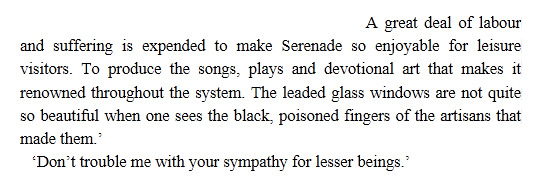
happy el muchacho monday folks im spinning my Wheels and Going Insane over this part in The Infinite and the Divine. Sure, they're talking about humans, but according to necron hierarchy Orikan? is also a 'lesser being'??? 😭 Especially since the necron he's talking to also outranks him and was happy to gloat about it five chapters ago??? If anything, he's quite fortunate that Trazyn's the way he is - who else could Orikan talk to like this?
I find this line fascinating. Not only is it proof of Orikan's moral hypocrisy, it's also proof that he sees Trazyn in a light he sees no one else in. There's no way Orikan could say this to any other Overlord. Consider how he leveraged himself against the authorities in the trial scene: think about who has my back, think about the debts you owe me, think about the services I could provide. His words cut deep, but these are bargains and threats and reminders, not personal judgements on someone's rank and character. Orikan is proudly anti-authoritarian and unafraid to show it, but there is a tangible limit to how far he can question his superiors before he'd be put in his place. It's what happens when he tries to give Trazyn's ship a command, and it's why we only see detailed justifications of his anti-authoritarianism in his POV, because as far as the higher-ups are concerned it's not open for discussion.
Keep it in your head. Or talk to Trazyn, since he's as weird as you are.
And that's a significant outlet, I think. Trazyn is about the only one whom Orikan feels comfortable commenting directly on his character: you care too much for the lowly, and that's not right, and you make me uncomfortable. I doubt he could say the same thing to Imotekh if the latter suddenly began displaying sympathy for human beings, nor to most other necrons of high rank. Clearly he said this because he did not feel Trazyn, as an individual, would retaliate against his judgement. And he was right - Trazyn just shrugs it off, without withdrawing his moment of compassion. Orikan pursues it no further and there is no punishment. It's bitter, it's dismissive - but it was a conversation.
He can actually have those with Trazyn. Something about beings approaching his own level, and it being nice to talk to them, yada yada.
But that's not to say Orikan doesn't suffer for his judgement. That's where the moral hypocrisy comes in. He's not doing himself any favours saying it like that, not just because his xenophobia is bullshit from our reader's perspective, but because he is willfully inauthentic to the space he occupies in the world. Necron culture is rankist. Elitist, classist, chauvinistic. The only necrons who aren't are either clinging to a sense of honour (not guaranteed to be returned, nor perceived by honour by non-necrons), insane, or so fallen down like the Flayed Ones as to be not considered necron at all. Necrons may or may not practice polite conduct with those higher up, but they do tend to know who's beneath them, and are happy to punch down as they see fit; for Orikan to speak of 'lesser beings' is normal, for him to talk about artisans that way is not, or shouldn't be.
The only artisans left in necron culture are the crypteks. They create things, they maintain things - it's the crypteks who wrote the play, War in Heaven, the theatrical piece our protagonists rely on so much. When Trazyn speaks of the human artisans' suffering on Serenade, he's really making a statement about the value of art - what kind of person does it take to create such a thing, what does it mean to consume them? - and for Orikan to dismiss it as a lesser act for lesser beings is to dismiss his own profession.
It's exactly what the nobility he hates likes to do.
Which: fair enough. There is not much love between crypteks. But I don't think Orikan's judgement is the kind of thing that stops at interpersonal rivalries, nor is it just a humanities vs. STEM argument. You could read his line at face value (humans are just insects to necrons, newsflash of the year), but you could also attribute any level of hypocrisy, denial, and/or self-deprecation to it, and it would be consistent with his character. None of it stops him from growing, or making him worse, depending on what mood seizes him. Gotta love me some bad faith necrons, they are such intriguing food for thought
#warhammer 40k#trazyn the infinite#orikan the diviner#the infinite and the divine#necrons#necron#trazyn#orikan#essay#mr rath the ten-year full script of war in heaven when???
81 notes
·
View notes
Text
(before this post starts, i want to say that equal person and chosen person (and my own special thing: trophey person), are NOT official terms. they are terms made up by the community to easily communicate the types of emotions and the types of relationships someone with npd can have for another person.
just cuz equal person and chosen person are popular, doesn't mean you *have* to use them if you don't want to.
this whole thing is made up. make your own terms and have fun! like i did)
equal person.
people with npd will talk about their internal hierarchies a lot. they rank people in their head on a scale of inferior -> equal -> superior.
for a while, i questioned myself on whether i have one or not. but i do. my internal hierarchy is just different than what is mainly talked about.
in mine, i don't include myself on the tier list. i don't rank people in accordance to me. but in how i feel about them. i'm still trying to figure out the inner workings of my hierarchy, so i can't go into much detail yet. but the gist of it is like "scum -> worthless but mostly inoffensive -> fine -> i like them -> i love them -> trophey person."
i don't put myself on the internal hierarchy because i see myself on a completely different level from everyone else. because of this, i will never have a "true" equal person.
chosen person.
i still don't fully grasp what a chosen person actually *is*. it seems like it is a vague term that many different experiences fall under. everyone has a different definition for it. sometimes those definitions fit into what i personally experience.
but i don't like using chp *because* it doesn't intuitively make sense to me, nor does it easily explain the feelings i have to someone who doesn't know the definition. equal person doesn't have this problem. it is easy to understand. someone who is an equal.
there are common experiences and feelings relating to having a chosen person that i don't relate to at all, too. so using it would feel like i'm misrepresenting myself in a way.
i don't feel like a god who picked out a random mortal to be my muse. i don't feel like this high and mighty man who decided, out of the good of my heart, to let some inferiors mingle with me.
(who knows maybe i'm being too autistic over the term chp lmao.)
this is why i use trophey person. it calls to mind the concept of a trophey wife.
a woman who is seen as a status symbol for a man. she is only there to boost the man's ego, and to make him feel powerful. she has no merit or use outside of her husband.
a trophey person is a person who is seen as an extension of someone else's ego. because of this, feelings of possessiveness and obsession run rampant. they are reduced into an object to adore, rather than a human being.
aaand because i am nice :3 if someone who doesn't have npd relates to this experience and wants to use the term: go ahead and use it. idc lol. if trophey person becomes a popular enough term that people will try to tell you it's npd exclusive, just tell them to fuck off.
(below are my more personal thoughts about having a trophey person. idk if my simple definition was easy to understand, so if you don't get it, maybe my messy rambles will help?)
i see a trophey person as an extension of my ego. i want to spend my money on them, i praise them, i want to show them off to everyone. they are like an object for me to decorate and cherish. i adore them. they are my most beloved person. i am possessive over them because they are *my* thing. *my* object.
i have strict moral rules that everyone except me and my trophey person have to follow. they can do deplorable shit and i won't care (and might praise them for it too) but if anyone else does it then i'll hate them.
they are not my equal. if i saw them as an equal, i would not be treating them like an object.
i care the most about them and their thoughts because i want to know every last detail about them. i want to figure them out. i want to have them all to myself.
they become an abstract idea to me. a game i can solve if i input the right dialog.
i want them to be dependent on me. they can have other people, sure, but i am the only one who will *always* stay with them. and if they don't want me anymore? then i get thoughts like, "suffer for the rest of your life then! fuck you."
i put in extra effort to manipulate them to like me, and when all that effort is all for naught, my feelings of hate for them are the strongest out of anyone.
my ex friend i made a couple posts about? yeah they used to be one of my trophey people. but now i despise them with my entire being. not gonna go into the graphic details of my hatred, cuz i don't wanna get a callout post made about me or something lol, but just know that it is BAD.
if they didn't used to be my trophey person, i wouldn't hold these strong of feelings.
i have another ex friend. i did care about them a lot. but nowhere near the level of being a trophey person. when they blocked me on everything a couple months ago, i was sad for a day before mostly getting over it after a month. i only think of them in a "ah man. sucks that it didn't work out. i still love these precious memories though <3" kind of way.
my ex trophey person friend drama started happening in december of last year and i still haven't gotten over it. for comparison. lol.
18 notes
·
View notes
Text
BCF’s author has a lot of questionable word of god statements. A personal favorite of mine to whip out every so often is this one.

What. the fuck?
this one is a lot.
Okay, before I even break this down let’s engage with the contrast of Saint and The Dragonslayers compared to Cauldron. I don’t think they’re Cauldron in miniature, I think they’re an inversion of them. Cauldron knows that Scion is an entity but not much about his behavior, while the Dragonslayers know Dragon is an AI she is communicative. Dragon, as she is in Worm, isn’t malicious nor a major risk of becoming so, Scion snapping is an inevitable event. The Dragonslayers are run by a man with a tattoo addicted to artificial powers while Cauldron by a woman without any to her name who gives others artificial powers and tattoos. And of course the Dragon Slayers are ineffectual and ego-paranoia driven, while Cauldron keeps the world running and is coldly utilitarian facing down the apocalypse. The compare contrast between the groups is actually fairly interesting.
Now the actual comment. Jesus Christ. The most problematic line in all of this is obviously “at no point does either group step back and ask if they are really the best people to deal with the problem in front of them.”
How this is a valid critique of Cauldron, a group made of some of the most powerful capes on the planet including Contessa I’m not sure. I don’t think Congressman Terry is a valid perspective especially since they prop up the government. I don’t think random scientist seven is a great pick since once, Doctor Mother, two, Manton. I don’t see how even if they opened their doors they could find someone more competent than they already have found in the likes of their own. I just….what? Who? Josef isn’t a real worm character and no I would not put him on the list personally anyways even though cauldron would because they don’t care about their egos they care about the end of the fucking world. They don’t like their jobs.
I don’t see the first paragraph of criticisms towards the dragon slayers even applying. Cauldron naturally can’t act earlier. Telling people about the nature of Scion is a massive infosec risk as well as just dangerous to the public and capes at large and frankly it wouldn’t be productive either. Cauldron isn’t a friend group like the Dragon Slayers are it is experts and then their many vassals. The dragon slayers are with outside help barely able to manage dragon tech. Cauldron is the leading shard understanders in the setting. They are the most qualified people in the setting and are a major reason scion died. Cauldron won, folks. They wanted to kill Scion any means necessary and they successfully created the scenario. Saying it was a pure chance thing isn’t a valid detraction considering 1 they were aware of that and doing their best to inflate that chance 2 no one would have done better. Their plan was not to personally kill Scion but arrange the highest possible chance that the dies. Dragon survives, Scion doesn’t, says something about the two groups.
The “wider perspective” on Cauldron and Scion edges into meta territory and again I don’t think your oc/si is superior for having magic knowledge inserted into his brain for free that no one else can get. I think that’s a pretty simple stance but hey I’ve seen it a thousand times. Also on a moral standpoint if we’re going to judge Cauldron harshly that’s a different discussion and also again Jozef is far from moral anyways which is not intentional. But you know whatever cauldron bad case fifty three sad are there any more children Joe can make too nebulously mature to date their own age and then dump his trauma onto
#Last sentence is a complaint about another wog but that’s for next time#brocktons celestial forge#BCF WOG
9 notes
·
View notes
Text
Today I feel much more charitable, so I decide to bring a more neutral comparison than usual.
I see a parallel between N!Hector trapping Lenore in a cage, ready to let N!Isaac kill him but pleading him to spare her, which means condemning her to a fate of being the only survivor of the fall of the castle and the death of its Lady and the knowledge that she failed and everything she worked for was completely pointless and her sisters were right in thinking she was just a stupid girl...


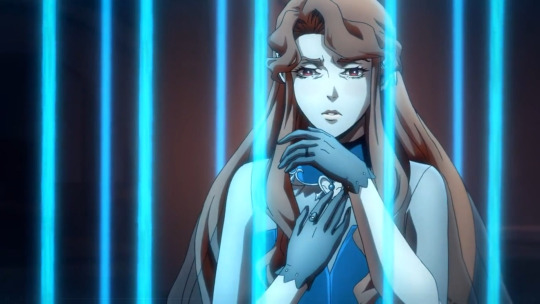
... and Hector sparing Isaac in their fight while crawling away to die alone, forcing Isaac to witness the ruins of the castle and realize he has lost his home, his Lord, his powers and his friend, tormented by the knowledge that he failed and he disappointed his Lord once more and he will never be able to rise from Hector's shadow.
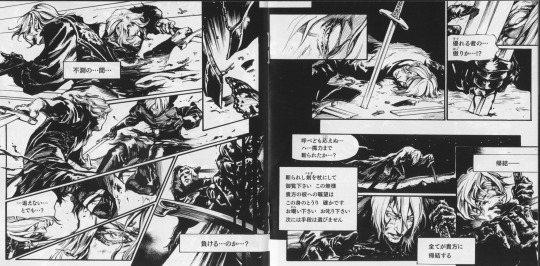
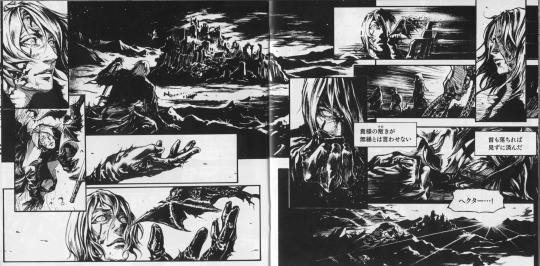
It's an interesting scenario. Cruel mercy to the highest order, at the expense of one's own life, made worthless.
Of course, Hector's decision to spare Isaac is much more interesting to think about, because it's never explained nor hinted why he did it, and we can only rely on context and subtext. Isaac, being Isaac, sees it in the worst way: "Is this the arrogance of the superior one?" He thinks Hector, the favored General, wanted to rub his victory in his face. "My body is the proof of Your expectations for him." He fears Dracula's disappointment that, once again, he wasn't able to match Hector: his inferiority complex is gnawing at him. "Had you cut off my head, I wouldn't have to see this!" It's obvious that Isaac would have killed himself first thing if the thought of getting revenge didn't give him the strength to live on; he sees being forced to live as being forced to feel pain and humiliation, and this is why he decides to make Hector suffer as much as he can.
But these are only Isaac's thoughts, and he's obviously biased: did Hector really want to humiliate his former friend, is he truly that spiteful? Or perhaps he lacked the courage to finish him off, moved by a misplaced sense of mercy? Did he think he'd die on his own, and he didn't want Isaac's blood on his hands? Or did he simply not care, because his priority was getting away as fast as possible and damned all the consequences?
And why does Hector want to die? Didn't he get what he wanted, freedom from Dracula, the freedom to live as a human being? Was the guilt of killing so many innocents so heavy, that he didn't have the strength to live on in the world of humans that already rejected him when he was still sinless? Or perhaps it was the guilt of nearly killing his former friend, the only person who could remotely understand him? Was it only a matter of pride, dying as far away from Dracula as possible, choosing death as a free man rather than a cushy life as a weapon?
We have no answers, and we don't need them, because we can put the pieces together by ourselves. My personal interpretation is that yes, in some part, Hector cared about Isaac: their relationship was strained and they were already diverging in personalities and morals, but we still see Hector seeking empathy from Isaac when he brings back the severed hands ("You're human too, aren't you?"). When Isaac intercepts him, he expresses his anger against the humans who have chased them away, something Hector can still relate to despite his choice to throw it all away. And despite wanting to kill him, Isaac was noble enough to bring Hector a sword, so that they could fight fairly: he, too, cares to an extent, even if he's eager to punish the traitor. All of this considered, I can imagine that Hector didn't have it in him to give him the coup de graçe. Dracula's most efficient, coldest General still has a hint of softness in him. Which means that yes, he chose to let himself die out of guilt both for his sins and for Isaac, having at least achieved the symbolic freedom to die as a man. But if someone wants to see it as Hector not even caring enough about Isaac's fate, only selfishly concerned with himself, maybe even as a final show of how much stronger he is so he better not be underestimated, it's not impossible.
With N!Hector it's all much more straightfoward. He likes Lenore: if his previous sarcasm and the snappy way he reminded her of the way she "solved his problem" could have hinted at simmering resentment, this act shows that there's no spite in his heart. He has fully forgiven her for her betrayal, and doesn't consider her Carmilla's accomplice after the talk they had previously; charitably, he could see her choice to check on him rather than Carmilla as proof that she has switched alliances, or maybe he empathizes with her as both of them felt lied to by their Lord/Lady. This is not payback to him, shown by the fact that after Carmilla kills herself, he admits he only wants Lenore in his life, either out of genuine fondness or because he has nothing else. If Hector fully freed himself of Dracula's and Isaac's influence, rejecting his power, the safety of his castle and position for the sake of his principles, N!Hector's decision to stay in the castle and with Lenore of his own free will, even after severing the bond that forced him with her, sends the clearest message: "I love you despite everything".
(and I'm not even considering that the sin N!Hector was ready to be executed for was betraying Dracula, long after he should have understood that it was not a mistake - although I can be even more generous and think that after all the torture he went through, after he was made to feel like a failure of a human being good only to be kicked around, no wonder he'd lose his will to live)
I would like to draw a parallel between his actions here and the fact that ever since he was a child, N!Hector forced dead animals to live on so that they could keep him company, a childish definition of love that fits well in vampire society. On one hand, it would make sense and greatly combine kindness and selfishness which is the main reason I find N!Hector compelling; on the other, it would be yet another proof that all this time, he didn't grow up - until Lenore decides to kill herself to escape the pain, and then he finally accepts he can't force creatures to stay with him. Problem is, since during the raid he was fully convinced N!Isaac would kill him, this is a moot point: he didn't care about Lenore's company until he was made to live. It was fully for her sake, to protect her life regardless of his own. This theme could have been touched upon in the last episode, when Lenore is still kept captive for apparently no reason other than the fact that N!Hector wants her with him, even if she is miserable, but much like N!Hector, Lenore doesn't seem to hold any resentment against the man who betrayed her (deservingly or not), destroyed her life and forced her to go through it. Her lack of reaction is especially blatant when you compare her to Isaac's seething hatred for Hector for the exact same reasons.
The other parallel I could draw is that this is more or less what Lenore had done to him. Lenore in S3 wanted to keep N!Hector safe from her sisters, who didn't see the point in keeping him and were ready to replace him with mercenaries. Her way to make him needed was to force him into the position of her pet, and by doing so, he lied to him, betrayed him, raped him by deception (the story forgets about her intention of repeating the experience for the sake of making her redeemable), and forced a cursed ring on him that would bring him pain if he thought of running away or rebelling. And sure, N!Hector got a good deal in that he was allowed freedom of the castle and nice quarters, but at first he was obviously devastated that he was trapped and made into a tool by the woman he trusted. Likewise, N!Hector protected her life from N!Isaac's rampage, but he did so by going behind her back and aiding the man who killed Carmilla and conquered the castle. If Lenore, in theory, held no malice, N!Hector didn't either. However, needless to say, karmic punishment was the furthest thing from his mind for all the reasons I said above; and besides, the moral exposed by N!Isaac was "revenge is for children and it's time to grow up", so this is more of a narrative parallel than a character parallel.
The only conclusion that can be drawn is simply that N!Hector thought Lenore, and only her, was too good to deserve death, and didn't consider the emotional toll that forcing her to live would cause her until she sunned herself and he had to let her go, the only character development he has in the very last minute of his arc. I would have loved if he had shown more resentment and confusion towards her for the bipolar way she has treated him, to make the choice more poignantly ambiguous and less... well, what I always complain about.
Nevertheless, this brand of accidentally cruel mercy is an inherently cool concept. It's just that, like many good ideas in NFCV, the game series did it better.
#long post#castlevania#netflixvania thoughts#akumajou dracula#prelude to revenge#netflix castlevania#not sure if i should tag the ships#not tagging it as anti because for once i'm not bitching#(well... not too much)#this is a serious analyses of the two scenes#now i hope brain lets me go#analyzing is fun but i feel obsessive lol#i just. the story. the themes. the narrative.#prelude of revenge my entire beloved <3
12 notes
·
View notes